Literary Vibes - Edition CXXXV (24-Nov-2023) - POEMS & CRITIC REVIEWS
Title : Cottage (Picture courtesy Ms. Latha Prem Sakya)
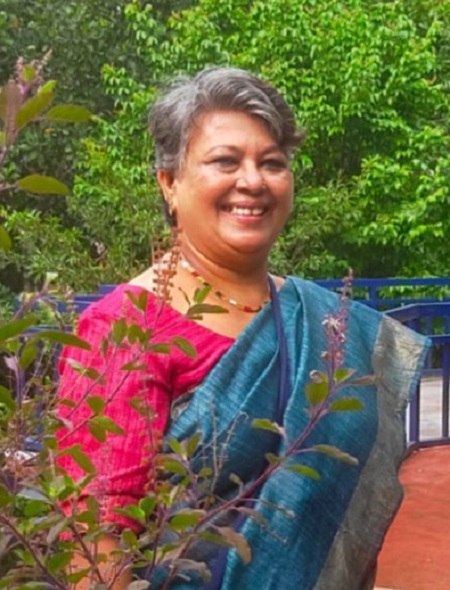
Prof. Latha Prem Sakya a poet, painter and a retired Professor of English, has published three books of poetry. MEMORY RAIN (2008), NATURE AT MY DOOR STEP (2011) - an experimental blend, of poems, reflections and paintings ,VERNAL STROKE (2015 ) a collection of all her poems. Her poems were published in journals like IJPCL, Quest, and in e magazines like Indian Rumination, Spark, Muse India, Enchanting Verses international, Spill words etc. She has been anthologized in Roots and Wings (2011), Ripples of Peace ( 2018), Complexion Based Discrimination ( 2018), Tranquil Muse (2018) and The Current (2019). She is member of various poetic groups like Poetry Chain, India poetry Circle and Aksharasthree - The Literary woman, World Peace and Harmony)
Dear Readers,
I have great pleasure in offering to you the 135th edition of LiteraryVibes. It comes decked with beautiful poems and enchanting stories. Hope you will like them and share the LV with your friends and contacts.
We have two new writers in today's edition. Ms. Latha Chandran, a doctor from Miami, Florida across the seven seas, loves to write and pour her myriad experiences of life into the cup of literature. She is incredibly talented, as is evident from the deeply thoughtful article she has written for LiteraryVibes. Equally magnificent is Ms. Sreetaawi Chakraborty, a Professor of English from Kolkata who has written an adorable review of Ms. Sohini Sen's A Drop of Golden Sun.. Let us extend them a warm welcome to the family of LiteraryVibes and wish them the very best in their professional and literary career.
I am also happy to inform you that Ms. Meena Mishra, one of LV's regular contributors, has offered to post her novel Pindaruch in LV for the readers of LiteraryVibes. It is a beautiful piece of writing, professing to be the Tale of A Maithili Girl. The novel has received fabulous reviews and great critical acclaim. I am sure you will like it and join me in thanking Ms. Mishra, the Founder and CEO of Impish Lass Publishing House for her magnanimous gesture.
On October 24th, the Vijaya Dashami day, we had published a Special Pooja Edition of LiteraryVibes with 12 superb short stories. Shri Prabhanjan K. Mishra, one of our leading contributors, has been kind enough to write a review of the stories and send it to me for inclusion in LV135. I do hope that reading the review will spur the readers to open the Pooja edition ( https://positivevibes.today/article/newsview/507 ) and enjoy those beautiful stories.
Today's edition of LiteraryVibes also comes loaded with an enjoyable travelogue on a great tour of England by Shri Satish Pashine and an article on Environmental Protection by Dr. Ashok K. Mahapatra, the eminent Neuro-surgeon. Two instructive episodes from the pen of the prolific gynaecologist Dr. Gangadhar Sahoo, combine to make the LV135 a delectable literary bonanza.
As I write this, sitting in a friend's awesome home at Lucknow, seeped in the soothing glow of a glorious winter morning of 21st November, I feel overwhelmed by my great experience of the past one week, travelling from Allahabad to Varanasi and finally to Lucknow via Sultanpur. It's a soul-satisfying journey and I am planning to write about it once I return to Bhubaneswar, my cute little hometown. I will be able to post my short travelogue in the next edition of LiteraryVibes. I don't want to spoil the effect by writing some lackadaisical piece in a hurry.
The month of November is famous for Children's Day, celebrated on the birthday of Chacha Nehru, our first Prime Minister, who was a darling of children of the country. India, with its rich heritage and culture has always believed in inculcating the right values in our children. The fact that many eminent persons such as Dr. Abdul Kalam and our current Prime Minister Shri Narendra Modi achieved spellbinding success, despite their humble origin, testifies to the role of good values of sincerity, commitment and determination taught by the family elders. Just look at some of the cricketers like Mohammed Shaami, Ravindra Jadeja, or Siraj, members of the Indian team which made us proud by its sterling performance in the recently concluded World Cup. They all come from families which sacrificed a lot to buy cricketing gear for their children and yet taught them never to give up their goal. A great nation is built upon the values of honesty, integrity and dedication imparted to its children.
I recently came across a story on a similar theme which moved me a lot. I am.presenting it here for the benefit of our readers:
xxxxxxxxxxxxxxxx
A STORY BY SHRI J. P. SHARMA
My wife and I boarded the Janmabhoomi train at Visakhapatnam station to attend my friend’s daughter’s wedding at Rajahmundry.
The early morning breeze and the train’s rocking movement were soporific and we dozed off until the train halted at Tuni.
I hailed a passing vendor and asked for two cups of coffee.
I handed over one cup to my wife and took a sip. I complimented him on the coffee and asked, “How much?” as I opened my wallet to find that it had only 200-rupee notes.
Hearing his response of twenty rupees, I handed over a 200-rupees note to him.
“Don’t you have change?” he asked as he put down his flask and started searching for change in his shirt pocket.
The train started, before he could take the change out of his pocket and sped away.
Our compartment was next to the engine so he got no chance to hand over the change though he did attempt to run after the train.
I blamed myself for having ordered coffee without checking the availability of change.
“Oh my God! How foolish of you! Could you not have taken the change and then handed over the note? What’s the use of your age and experience?”, my wife gleefully took the opportunity to snub me.
I tried to justify my action, “Okay, suppose he had given the change and the train had started before I could give him the note….. then would it not have been a loss to him?”
“What loss? From morning, he would have met ten people like you and at the end of the day he will have only profit, no loss!” replied my wife, with a cynical smile on her face.
“We should trust people; poor fellow, what can he do if the train started? Will he subsist on our money?” I replied.
My better half was irritated to hear me defending him.
“They wait for just such opportunities. If he meets four simpletons like you, it will be enough to earn a day’s living,” grumbled my wife glaring at me.
I maintained a stoic silence.
“Anyway, you cannot expect him be as honest and as principled as you are”, she concluded looking around at the other co-passengers, who were all looking at us.
The train had picked up speed and we crossed the next station Annavaram. Gradually, I let go of the slender hope that I had of getting back the change. My wife generally believes that I get cheated by people since I have a naïve faith in mankind and I am kind.
I was quite accustomed to being put down by her and being scolded since I believe that she is not correct in distrusting others. I strongly believe that we should see goodness in others and if anyone lacks it, their baseness should be attributed to the environment and conditions in which they grew up. I believe that inside each of us, there is the potential for both good and evil - what we choose depends on the circumstances.
Though I have been proved wrong by her on many similar occasions, it did not affect my faith. I believe that dharma or righteousness is upheld by its fourth leg of trustfulness.
“Let it go! Poor people! Are they going to build palaces with our money? Forget it!” I said trying to pacify her.
She stayed silent, out of her affection for me and I was in no mood to prolong the conversation.
The compartment was filled with many standing passengers. I let my gaze slide outside to the fleeing fields. By then many of my co-passengers were looking at me and assessing me according to their perception – some were thinking of me as a fool while others were looking at me with sympathy and pity; some were smiling to themselves about the free entertainment they had enjoyed and some were curious to see what would happen next. By the time the train reached the outskirts of Pitapuram, all had lost their interest in us and were lost in their thoughts.
It was then that I heard a voice, “Sir, was it not you who bought two coffees and gave a 200 - rupees note?”
I turned towards the voice. Pushing his way through the crowd was a teenage boy, who stopped in front of my seat.
Suddenly I felt elated though he did not look like the coffee vendor whom I remembered as being middle aged.
“Yes, Son! I did give a 200-rupee note to a coffee vendor but the train sped away before I could receive the change. However, I do not remember buying coffee from you,” I said honestly.
“Yes, Sir! But are you the person, who drank the coffee at Tuni station”, he asked me again.
“Why would I lie? If you want you can ask these people here.”
“No! No, Sir! I do not doubt you but I was just confirming to avoid making a mistake!” Saying this, he took out the change of 180 rupees from his pocket and handed it over to me.
“You are.....?”
“I am his son, Sir”
I looked at him with surprise since he seemed to have guessed my doubt.
“Sir, every day one or two such incidents happen at Tuni station because the train does not stop there for long. In that short time many people panic, give a note and the train starts before they can receive back the change. That is why, I usually board the train and wait. My father messages me giving details of the amount, compartment and seat number of the persons to whom the change has to be returned. I return the change and get down at the next station and return back to Tuni by another train. My father leaves some change with me for such transactions.”
I was surprised but still managed to ask, “Are you studying?”
“Tenth class, Sir! My elder brother helps father in the afternoon and I help him in the mornings”.
When I heard this, I felt like talking to his father, so asked him for his father’s phone number and dialled the number.
“Your son has just returned the change for the 200-rupees note. I am calling to express my appreciation for your actions. I am so very happy that you are not only educating your children but more important instilling in them the values of honesty and integrity”, I said, complimenting him.
“That is very nice of you, Sir! I feel honoured that you are taking the trouble to call just to express your appreciation. I have only studied up to fifth class. In those days, short stories about ethics and morality were narrated to us and textbooks also had material that strengthened values like honesty and integrity so we learnt to differentiate between good and bad, right from wrong. It is those principles, which guide me to lead a trouble-free honest life.”
As I listened to his words on the phone, I was amazed by his words and thought process.
He continued, “But today those values are not taught in schools. What children are taught these days is as unhealthy as giving spicy food to babies. When my children were studying at home, I used to listen to them and I noticed that the curriculum no longer has moral stories, inspiring poetry or children’s books by Paravastu Chinnayasuri – nothing of value! That is why I entrust them with simple tasks like these to pass on the few values that I know. That is all!”
I was amazed by the foresight of this man and I just patted the son on his shoulders.
My wife was taken aback seeing the glow of joy on my face as I placed on her hand the 180 rupees, returned by the boy in my wallet. She gave me an apologetic, sheepish smile because she knew that the joy was not for the money regained!
I remembered that in Srimad Bhagavatham, righteousness or dharma is described as Nandi the ‘bull’ who stands on four ‘legs’—austerity, cleanliness, kindness and trust or truthfulness.
The Bhagavatham also predicts that all the four legs will not be equally strong over epochs of time - representing the degree of decline of righteousness. In the world, during the Satya Yuga, the first stage of development, the bull would stand firmly on all four legs but as the yugas changed, one by one the legs would be broken and lost until finally in Kali-yuga (the present age) only truthfulness or trust would be the dominant form of Dharma or righteousness.
This humble coffee vendor’s action appears to be proof that as predicted righteousness or dharma still flourishes in this World though it is on its fourth leg of truthfulness.
As I watched the boy move down the compartment, I mentally saluted the coffee vendor!
(Shri J.P.Sarma is a State Bank of India employee and the author of Edari Parugu: Kadhala Samputi in Telugu)
xxxxxxxxxxxxxxxxxxx
It's really a very nice story, cutting across the thinking of different generations and emphasizing the fact that good values are not necessarily the monopoly of the rich or the educated. The poor and uneducated also carry the torch of honesty and integrity with pure, unadulterated commitment. It reminded me of a story I wrote in 2011, named Cassette. Let me take the liberty of posting it, along with a new story in the present LV edition in the Short Stories section.
Hope you will enjoy the offerings in LV135 and forward the following links to your friends and contacts:
https://positivevibes.today/article/newsview/519 (Poems and Book Review)
https://positivevibes.today/article/newsview/518 (Short Stories, Anecdotes and Travelogues)
https://positivevibes.today/article/newsview/517 (Kid's Magic)
https://positivevibes.today/article/newsview/516 (Two medical related Anecdotes by Dr. Gangadhar Sahoo)
https://positivevibes.today/article/newsview/515 (The Novel Pindaruch by Ms. Meena Mishra)
https://positivevibes.today/article/newsview/514 (Article on Environmental Protection by Dr. Ashok K. Mahapatra)
https://positivevibes.today/article/newsview/513 (A long Travelogue by Shri Satish Pashine)
Do take care and enjoy the cool fragrance of winter. We will meet again on the 29th December with the 136th edition of LiteraryVibes.
With warm regards,
Mrutyunjay Sarangi
Table of Contents :: POEMS
01) Prabhanjan K. Mishra
JAGANNATHA
02) Dilip Mohapatra
FORTUNE TELLING
03) Abani Udgata
FOREVER, DREAMS
04) Jairam Seshadri
EVERYWOMAN Part 18
05) Madhumathi H
A DROP OF ETERNITY...
06) Sreedharan Parokode
MONOTONY
07) Dr R S Tewari Shikhresh
WHEN MERGED.....
UNSUNG SONGS
08) Avantika Singh
THE ELIXIR OF THE MAHUA
AN ELEGY FOR A DIVINE CLOCK
09) Sujatha Santhanam
MY BROKEN PIECES
10) Padmini Janardhanan
FROM LONELINESS TO SOLITUDE.
11) Seethaa Sethuraman
MY PAIN
12) Ravi Ranganathan
LONE ZEALOT
13) Dr. Bidyut Prabha Gantayat
THE CABBAGE HEART
14) Pradeep Rath
DAYDREAMING
15) Nisha Luthra
RAIN
16) Sujata Dash
WAVES OF DISTRAUGHT
17) Setaluri Padmavathi
DAZZLING LIGHT
18) Sudipta Mishra
DIWALI
A WITHERED ROSE
19) Bijayalaxmi Rath
PRICELESS CONNECTION
OWN SILENT WAY
20) Dr( Col) Rekha Mohanty
PASSION FLOWER
21) Bipin Patsani
NAME GAME
22) Anjali Sahoo
BIRTHDAY THOUGHT
23) Ms Gargi Saha
SAVE THE EARTH
RECIPROCAL
FLOWERS SELLING WOMAN
24) Manjula Asthana Mahanti
ATTITUDE
25) Nandini Mitra
FOR ONE LAST TIME
26) Sheba Jamal
TIMELESS
27) Leena Thampi
IMMORTAL DESIRE
28) Niranjan Barik
REGRETS OF A TEACHER!
30) Hema Ravi
BED REST
31) Dr. Thirupurasundari C J
WOMAN –HER UNIQUE TOUCH WITH EMOTIONS
32) Sukanya.V. Kunju
UPS AND DOWNS
33) Mrutyunjay Sarangi
THE STRANGER
BOOK REVIEW
01) Sreetanwi Chakraborty
A DROP OF GOLDEN SUN by Sohini Sen
CRITIC REVIEW
01) Prabhanjan K. Mishra
THE SPECIAL PUJA ISSUE (2023) OF SHORT STORIES
Table of Contents :: SHORT STORIES & ANECDOTES
01) Sreekumar Ezhuththaani
AN INTERVIEW
TO ERR IS HUMAN
02) Ishwar Pati
RULES OF THE ROAD
03) Dr Latha Chandran
THE POWER OF MY SACRED SPACE
04) Snehaprava Das
THE FAN
05) Meena Mishra
THE HAIRY TALE
THE COLOUR OF LAUGHTER
06) Hema Ravi
HAPLESS SOULS....
07) Asis B. Pati
THE SUNDAY MORNING SHOW
08) Dr. Sukanti Mohapatra
IDENTITY
09) Gourang Charan Roul
KOLKATA'S RIVERSIDE ODYSSEY...
10) Sujata Dash
MONSOON DIARY: AN INCURSION UNTO SELF
11) Sreekumar T V
STAR STRUCK
12) Bankim Chandra Tola
HONESTY
13) Nitish Nivedan Barik
A LEAF FROM HISTORY...
14) Ashok Kumar Mishra
FATHER, I WANT TO CONFESS
15) Sheena Rath
SHUBHO BIJOYA
16) Sreechandra Banerjee
AT THE MAHAKAL TELECOM STORE
17) Mrutyunjay Sarangi
CASSETTE
ANGELINA
Table of Contents :: YOUNG MAGIC
01) Anura Parida
CELEBRATION OF LIFE
02) Trishna Sahoo
MY SCALE
03) Meera Rao
GROWING YEARS
POEMS

A mystery and a bouquet of mystiques,
sculpted from legends, fleshed with myths;
you sit unmoved, wearing
a deadpan face, goggle-eyes;
neither basking at worshippers,
nor sulking at insolent defilers -
You should go on world-tours,
have moods, pretences, a voice;
a bit of pride, even some caprice;
if the myths are to be rewritten
or you be sculpted anew differently
from malleable mud, wax, or plastic.
You should take furtive peeks
from your windows, curious
about the world you created,
walk in bazar hand in hand
with goddess Laxmi, get chided by
big brother, teased by little Subhadra.
Allow us to pamper and spoil you, Lord.
Clothe and jewel you like a dark Adonis,
make you the slave of bed, breakfast,
even medicines and nautch girls.
Ask you, "What sort of movie would you
like to watch, action or romance?"
Or, would you remain in love with yourself;
a modern Narcissus, keeping
his wooden stance and impassiveness?
With us, blind believers, bleating lambs?
The sweet fruits, as your rewards,
bitter ones blamed on our destiny?
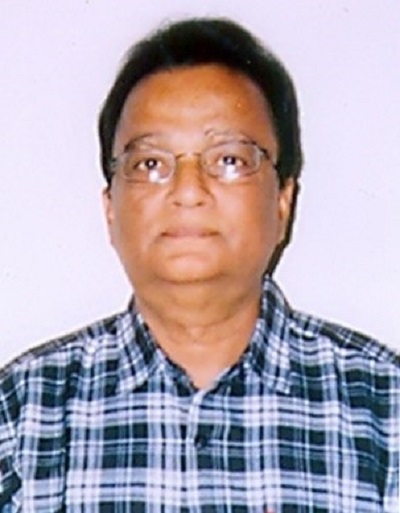
Prabhanjan K. Mishra is an award-winning Indian poet from India, besides being a story writer, translator, editor, and critic; a former president of Poetry Circle, Bombay (Mumbai), an association of Indo-English poets. He edited POIESIS, the literary magazine of this poets’ association for eight years. His poems have been widely published, his own works and translation from the works of other poets. He has published three books of his poems and his poems have appeared in twenty anthologies in India and abroad.

I really don’t know
why the hell should I
try to pry into my future
having traversed so far
when so little is left to cover ?
I really don’t know
why should I try to decode
the pattern of tea leaves
left at the bottom of the cup
or decipher the lines
on my palm
or ask the tarot card reader
to interpret the cards which I draw
or gaze into the crystal ball
and try to figure out
the changing shape of the
psychedelic figure inside
and read the glint in the gypsy’s eyes?
I really don’t know
why should I seek my identity
through my date of birth
the names of my parents
and my spouse
from sheafs of age worn palm leaves
till the unique one is found?
Why should I really care
when I know that
I am just a whiff of wind
destined to blow for a while
mostly to support and sustain lives
yet sometimes snuffing a candle or two
and finally to be sucked
into the cosmic chasm?
Why should I really bother
to look at my residual life
in the last leg of my run
through the prism
of my inevitable end?

Dilip Mohapatra, a decorated Navy Veteran from Pune, India is a well acclaimed poet and author in contemporary English. His poems regularly appear in many literary journals and anthologies worldwide. He has six poetry collections, two non-fictions and a short story collection to his credit. He is a regular contributor to Literary Vibes. He has been awarded the prestigious Naji Naaman Literary Awards for 2020 for complete work. The society has also granted him the honorary title of 'Member of Maison Naaman pour la Culture'. His website may be accessed at dilipmohapatra.com.

A surviving wonder.
A shoal that glistens
in moonlight bearing
the remnants of dead fish
scraps of dinghy’s last breath.
Why do those dreams lie
there and drench in rains
long, long after footsteps
reach the end of the road?
Long back someone said
all this is a dream within a dream.
When do the nights end?
The outer layer, thick skin
of an asteroid, facing its native star
bathed in unsolicited light
awaits distant redemption.
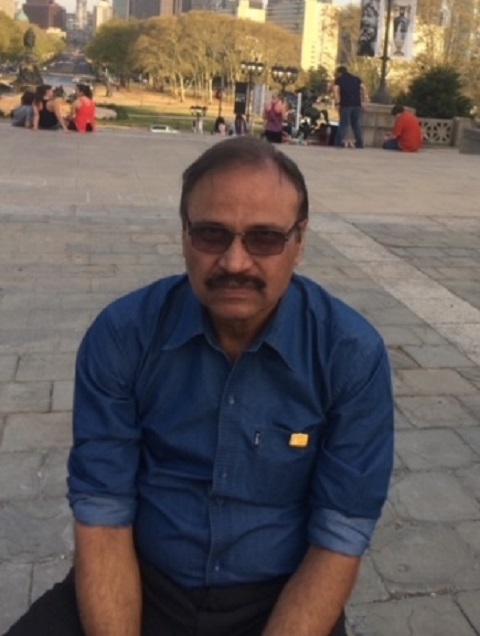
Abani Udgata lives in Bhubaneswar. Writes poems both in English and Odia. Udgata has been awarded in all-India poetry competitions and published in anthologies. He has been a regular contributor to LV. Email: abaniudgata@gmail.com

Her marauding man left her.
She, with two little boys,
He left her,
For another woman.
Women!
She did not lose heart,
She made tethered, frayed
Ends meet,
Cooking for families
Who chose her patted chapattis
Over their own pats.
She rose to the occasion,
Three mouths to feed,
Clothes adorned,
Shelter intact.
She was a mere witness
When her elder son
Chose the arms
Of a woman.
He left home
Nary a glance
Over broad shoulders,
Shoulders she had seen
Fill up and broaden in awe.
Yes, he left home
For another woman.
Women!
So she clings to her second,
Whose shoulders, too,
Like a wrestler's.
But this wrestler
Realises she needs
Assurance, a Reassurance,
He will be there for her.
Always.
And every betrothal that comes his way,
He is witness to an eclipse
Of the Sun,
The Moon, too
That blocks all light,
And his mother's
Overbearing breathing.
Women!
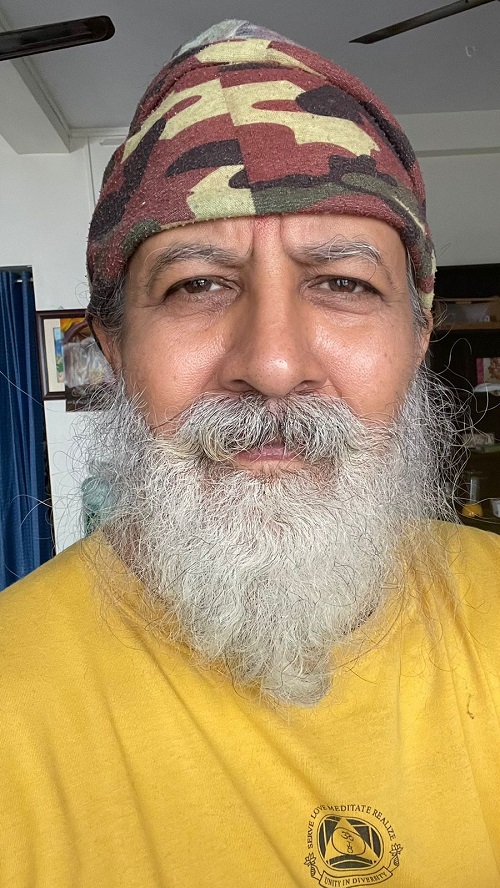
Jairam Seshadri is the author of MANTRA YOGA ( 2021 Rupa Publications) WOOF SONGS & THE ETERNAL SELF-SABOTEUR (2019 Partridge) and JESUS SAHASRANAM - THE 1,008 NAMES OF JESUS CHRIST (2018 Authorspress). He is a CPA with an MBA from the US and has worked in the U.S, Canada and England for over 30 years before returning to India to take care of his father.
He founded the India Poetry Circle (IPC)) six years ago, which has seven anthologies to the group’s credit, in addition to two more in the pipeline to be published this year. IPC, through its offshoot, IPC PLAYERS, has also produced and staged several skits, as part of its ‘POETRAMA’© series, including a production of Shakespeare’s MACBETH online. Shakespeare’s KING LEAR will be staged online this Christmas 2022.
Jairam lives in Chennai and can be reached at 9884445498 or jairamseshadri@hotmail.com.

Pigeons
Hundreds of them
Take flight
As the first shower
Lands on the golden sand
They carry
Footprints of memories
Stuck to their feet
Scatter them as they fly
Upon another slice of earth
And
One day
When we walk together
By that riverside
We shall find
Those tiny plants
Growing
Like stencils of our souls
Deeply rooted
In the soil
That have some grains
Of the seashore sand
Carrying the scents
Of our conversations...
Leaving our footprints
Eyes whispering tears
We begin again
In gratitude
To flow like the river
And merge with the ocean
Of love, and light.
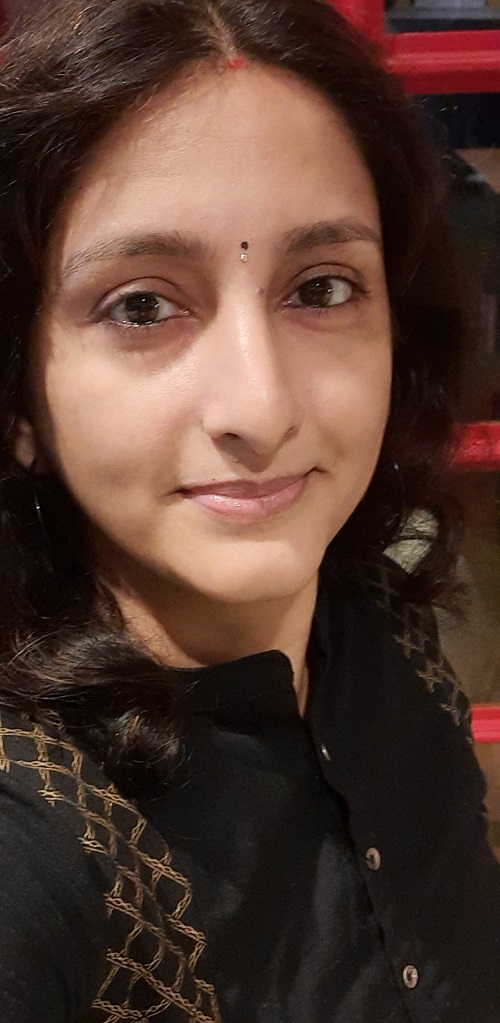
A bilingual poet-writer(Tamil, English), Madhumathi. H is an ardent lover of Nature, Poetry, Photography, Music. Her poems are published in Anthologies of The Poetry Society(India), CPC- Chennai Poetry Circle's EFFLORESCENCE, IPC's(India Poetry Circle) Madras Hues Myriad Views, Amaravati Poetic Prism 2015, and in e-zines UGC approved Muse India, IWJ - International Writers Journal, Positive Vibes - LiteraryVibes, Storizen, Science Shore, OPA – Our Poetry Archives. e-Anthologies Monsoon moods - Muse India, Green Awakenings - On Environment, by Kavya-Adisakrit.
Ignite Poetry, Breathe Poetry, Dream Poetry, Soul shores that have 10 of her poems published, Soul Serenade, Shades of Love-AIFEST, Arising from the dust, Painting Dreams, Shards of unsung Poesies, are some of the Anthologies her poems, and write ups are part of. (2020 to 2022). Besides Poetry, Madhumathi writes on Mental health, to create awareness, break the stigma, believing in the therapeutic, transformational power of words. Contact: madhumathi.poetry@gmail.com :: Blogs: https://madhumathipoetry.wordpress.com :: http://madhumathikavidhaigal.blogspot.com/?m=1

Does monotony
Create noises?
It produces
unnecessary
enthusiasm on certain
moments.
Aloofness
Agony and
Awareness of the self
Do not peep into it.
The smile spent would help to have an inseparable link with
Giver and receiver.
Whether small or big
It will work on both the faces
Without
Class
Close
Category!
It lasts for the life time
Even when the giver is no more!
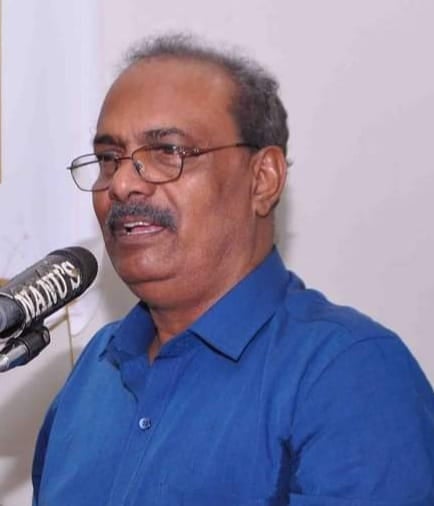
P.L.Sreedharan Parokode is a bi-lingual poet and lyricist from Malappuram district, Kerala. He has a Master's degree in English literature and Population Studies and a Post Graduate Diploma in Parental Education. Sreedharan has thirty books of poetry to his credit, including 'Weeping Womb', 'Slum Flowers,'Mahatma Gandhi' 'Nelson Mandela',Poems', 'Don't mum Please' etc. He has also written songs for professional dramas, for albums, songs for competitions, devotional songs etc. He has written songs for animation film also.
Sreedharan has attended various literary conferences in India and abroad. He presented his poems at World Congress of Poets, in Taiwan, 2015, China, 2018, and literary conference in Serbia, 2007.
He has received awards and honours from various organisations, such as, Sahitya shree Award, Sahitya Shiromani Award, Shan E Adab Award etc. He has also received an Hony.Doctorate from the World Academy of Art and Culture
Sreedharan is currently engaged in Doctoral Research in Population Studies from Annamalai University. Earlier he was working in the Administrative wing of the University of Calicut.

When two souls are merged
together,
The mystic bells are begun to hear.
The travail of long journey is rewarded ,
When truth and beauty stand pervaded.
Being one and feeling the same
Empowers one to curb ills and tame .
Hush of the breeze on dew drops
Conspiring with the sun , yields crops .
Life turns into a musical
strains ,
Subsiding undue material constraints .
Peace and comfort breed
blissful energy ,
Apathy and ailments turn
into synergy.
Here lies the metaphysical quest
That leads one to the due crest .
Love sprouts oneness and divinity
On this plane of mundane complexity.

Your unsung songs are still awaited
To be heard with echo
sublimated .
Delicacy touching the heart and mind,
Softens the core and cassette to re-bind.
Neither age nor time nor
any other hurdle
Can coat or carve the
epic of our cradle .
The breeze of music lulls
the memory of past,
And touches amorous
zones ,create and cast.
Let the starry rays spread
the glow and glory
Of your immortal love and lustre in life's itinerary.
Your phantasy, dreams and aspiration
Be a legend of beauty beyond creation.
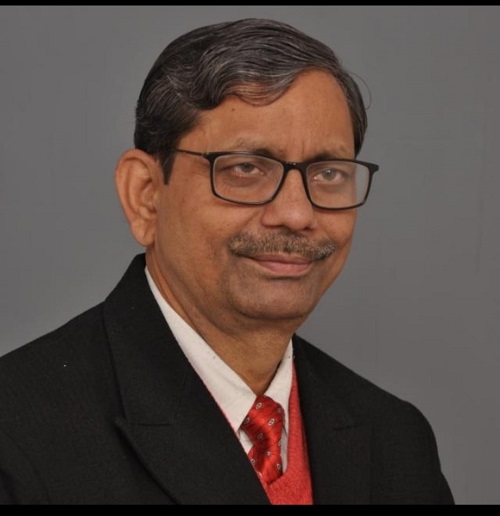
Dr R. S.Tewari 'Shikhresh' is a retired Assistant Director(O.L.)from Govt of India ,awarded by Honourable President of India,Honourable Governor of Uttarakhand and U.P.,Honourable State Home Minister (Govt of India) for commendable work in Official Language of the country is an M.A.( English Literature ,Hindi Lit. Philosophy ),PG Dip.(Translation and Journalism )and Ph.D.in Philosophy of Religion ,
Dr Tewari to his credit has 23 books of English verses,Hindi verses,books on Official Language and English Grammar.He has delivered more than five hundred lectures in various workshops on various topics.He has written more than a dozen of reviews of books in Hindi and English. Having started his career as an English teacher ,Dr Tewari worked as a Translation Officer, Hindi Pradhyapak and Assistant Director (Official Language) in Income -tax Dept.He has also served as a Consultant, Officilal Language and Communication in a training Centre of the ministry of MSME.
He has also worked in the Departments of Philosophy and Journalism in Agra University as a visiting faculty for a short span. Presently, he is a Visiting Faculty in the distance cell of D E I Deemed University, Dayalbagh ,Agra (UP),India.

Delicately bright in its pearly luminescence,
Flushed with the blush of youthly innocence,
Fresh with the dew of starry magnificence,
Grows the Mahua flower in glorious ebullience.
In the pink dawn, she quivers with her winsome essence,
Infusing the air with a heady incense.
And, falling to the earth in a gentle cadence,
Carpeting the ground in an alluring abundance,
A sight to hold in reverence.
Driven by the nocturnal fluorescence,
Lusting for her heady essence,
They come in droves for the inflorescence.
Determined to dip in the elixir of her effervescence.
And from their arduous existence find a deliverance.
In the harsh sun, they leave her to wilt and dry in endless irreverence.
Boiling her in the fires of hellish violence.
Till they have extracted her of every essence,
To drink night after night of her innocence,
In a fiesta of drunken decadence.
And she, robbed of her innocence,
Treated with harsh malevolence,
Still distils her spirit into the elixir of existence.
Transforming her mortal self into ambrosia in her nonexistence,
She finds her deliverance.

He was a divine clock on the wall sublime,
Sublime the wall that held the clock divine,
Who had stopped showing time.
For time had stopped for him.
For her, he was her time,
From childhood she had known him,
Played with him and grown into life prime,
Many a moonlight with him did she swim.
Her childhood sweetheart became her partner for a lifetime,
A small, sweet family sprung from their limbs.
Happy they were till COVID did the unthinkable crime,
That made their sweet time grim.
Struck was he in life prime,
Not fearing for her life, she cared for him,
In the hospital she spent her time,
Soothing his restless mind while cooling his fevered brow and limbs.
But, alas, out of COVID he could not climb.
All was lost, he was lost, and she was lost without him.
Her life's clock stopped telling the time,
For time stood still without him.
With the passage of time,
For her son, her truest legacy of him
She came back into her time
With Amazing Grace, his name became a hymn.
Watching from beyond time,
In the hall stands a divine photo of him.
He her divine clock on the wall frozen in time,
But keeping memories warm that even time cannot dim.
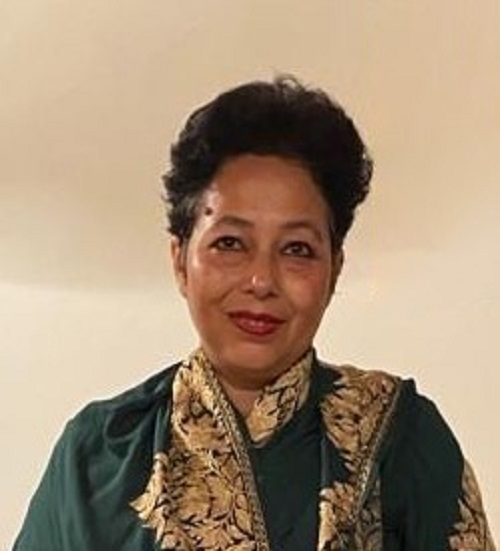
Avantika Vijay Singh is a writer, editor, poet, researcher, and photographer. She is the author of two solo poetry books i.e., Flowing… in the river of life and Dancing Motes of Starlight (her debut ebook). She is the winner of the Nissim International Award Runners Up 2023. She enjoys writing humour too for her blog “Ordinary People, Extraordinary Lives” in the Times of India.

Some unrealised dreams,
Some unfulfilled desires,
Taught me life's hardest lessons,
But left me a bit broken.
Some abrupt ties,
Some unintentional lies,
Burst the bubble,
But left me a bit broken.
Some wrong choices,
Some harsh voices,
Changed me for the better,
But left me a bit broken.
Some unanswered questions,
Some lost connections,
Albeit didn't let me down,
But left me a bit broken.
I gathered some pieces,
Some I left behind.
Although I felt lighter,
The flaws were noticed
even by the blind.
As I stand broken,
I also stand free,
Shedding the old skin.
To embrace the new me.
With wings still uncut,
Desires ever-growing,
I walk past the shards,
That lay there in vain.
Some forgotten pain,
Some deeply engraved,
Yet, I dare to go on,
Only to dream again.
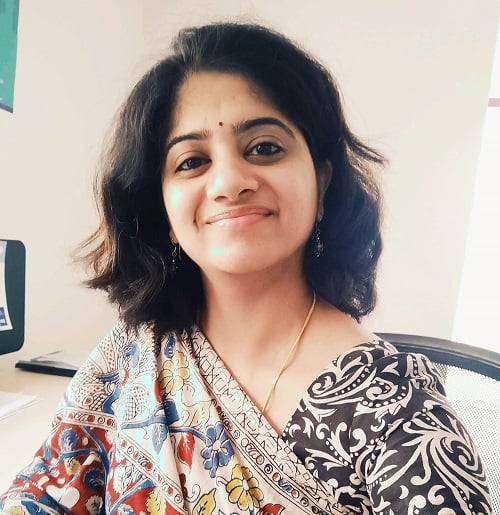
Sujatha Santhanam, founder and Creative Head at InkSpeak Creative, a published poet in Hindi and English.

Loneliness:
Depressing deafening silence
Dispirited despondent morose
Aggreived belligerent self talk
An extravert's most dreaded curse,
Solitude
Peaceful soothening silence
Introspective meditative
Growthful enlightening self talk
An introvert's cherished blessing
Sagacity
From dismaying rejections
To sanguine self validation
From searching to having arrived
From loneliness to soliftude.
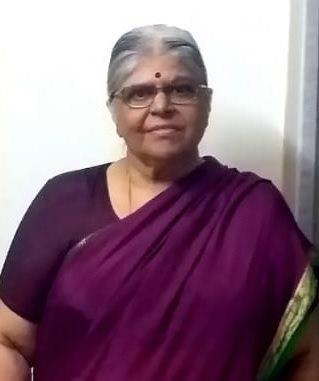
Padmini Janardhanan is an accredited rehabilitation psychologist, educational consultant, a corporate consultant for Learning and Development, and a counsellor, for career, personal and family disquiets.
Has been focussing on special education for children with learning difficulties on a one on one basis and as a school consultant for over 4 decades. The main thrust is on assessing the potential of the child and work out strategies and IEPs (Individual Educational Plans) and facilitating the implementation of the same to close the potential-performance gap while counselling the parents and the child to be reality oriented.
Has been using several techniques and strategies as suitable for the child concerned including, CBT, Hypnotherapy, client oriented counselling, and developing and deploying appropriate audio-visual / e-learning materials. Has recently added Mantra yoga to her repository of skills.
She strongly believes that literature shapes and influences all aspects of personality development and hence uses poetry, songs, wise quotations and stories extensively in counselling and training. She has published a few books including a compilation of slokas for children, less known avathars of Vishnu, The what and why of behaviour, and a Tamizh book 'Vaazhvuvallampera' (towards a fulfilling life) and other material for training purposes.

My pain is wholly and completely mine,
So, why the need to grimace and whine?
Just go ahead and continue to shine,
And make the world, forever thine.
When you surrender and accept the pain,
You will then see the real gain.
It may envelop you suddenly or slowly,
But, just embrace it bravely, even if hesitantly.
Endure the pain and then, learn to release it,
It was your pal for a while, but now, let go of it.
Outstretch your hands and your palms to set the pain free,
Feel the universe soak it up, leaving your mind wrinkle free.
My pain is wholly and completely mine,
So, why the need to grimace and whine?
Just go ahead and continue to shine,
And make the world, forever thine.
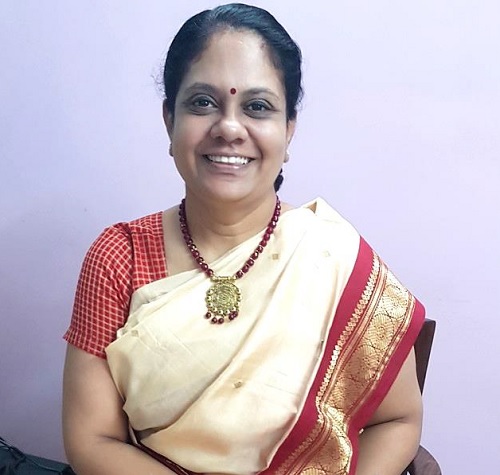
Seethaa Sethuraman has had a creative orientation right from her school days – dabbling in writing,drawing and painting as well as learning Indian dance forms and Carnatic music. Thereafter, the usual suspect in professional education and corporate pursuits assumed centre stage (B.Pharm, MBA by education and a Health market researcher by profession); till the pandemic strongly nudged her to delve back into her creative side; alongside her continuing corporate endeavours. While formally learning Bharatanatyam had already begun since mid-2018; writing poems and drawing-painting turned somewhat prolific since the last 2 years.
As per seethaa, she writes/ draws-paints when the calling within her turns so strong at that moment; that it just cannot be brushed aside till it has been acted upon. So far, she has been doing them for her own self without giving much thought about publishing them. Coming across the Literary vibes platform has, however, enthused her to share this creative happiness with the outer world. Through this process, she also looks forward to receiving feedback/ comments that will encourage her to keep creative expressing; always.

I began to walk my lonely miles
waded and wafted through many isles
away from scorn in search of smiles
a sojourn obscure drawing myriad profiles
yearning for the heart bereft of guiles...
... and then I met this lone zealot
an enlightened one at that..
Resplendent in every slot.
His every move wrote its own symphony
An oeuvre by himself like a deep ebony.
Serenely detached
from plenitude of awareness
basking blissfully
In self effacing greatness...
He patted me on my my back
With a gentle, kindly healing touch
saying simply, smilingly with a punch
‘Look up man and grin
with an upturned chin
Everything you seek
Is found within’...
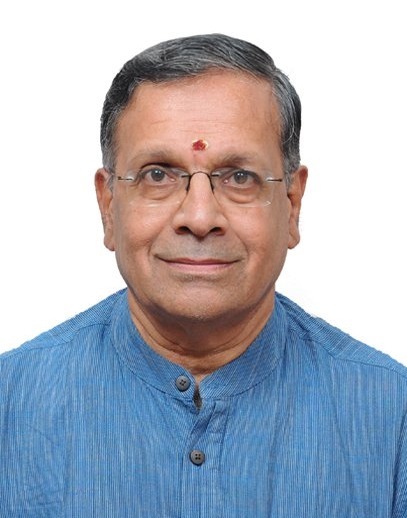
Ravi Ranganathan is a writer, critic and a poet from Chennai. Also a retired banker. He has to his credit three books of poems titled “Lyrics of Life” and “Blade of green grass” and “Of Cloudless Climes”. He revels in writing his thought provoking short poems called ‘ Myku’. Writes regularly for several anthologies. His awards include recognition in "Poiesis award for excellence" of Poiesisonline, Sahitya Gaurav award by Literati Cosmos Society, Mathura and’ Master of creative Impulse ‘award by Philosophyque Poetica. He contributes poems for the half yearly Poetry book Metverse Muse . He writes regularly for the monthly webzine “ Literary Vibes” and “ Glomag”.He is the Treasurer of Chennai Poets’ Circle.

Me and my siblings
Never relished the taste
Of the tender green leaves
Of a cabbage and the rich white
Blossom of the cauliflower
But, got a tinge of it
From the cabbage heart!
My mama says
Heart is the core
The cabbage heart
Is tastier than
The leaves and flowers
My mama
Used to collect those
Hearts from the landlord’s
Vast kitchen
They cooked the leaves
Of Cabbage and the bouquet
Like buds of the cauliflower
Discarding the center stem
As cook, mama worked
In the Kitchen long hours
Cutting vegetables
Preparing the dough
Mincing the meat and
Brewing soup
She never abstained
From her duties
Even on the day of her child birth
And the day our granny died
We used to look for her
Home coming cutting through
The darkness of night fall
Every day since the dusky
Evening until she emerged out
Of the rustic darkness
From the grassy fields
With hungry eyes
We used to figure out
Mama, out of the dark
the cabbage hearts
Wrapped in her head scarf
And draped around
The waist line and a basket overhead
The big bulge over her belly
Assured us a good dinner
All of us would spring
In to action with glowing
Eye balls when she poured
The wrap in to a bamboo basket
We used to pick and pile
The similar from the
Dissimilar, mama
Would take the
Day’s account from us while
Cooking dinner for us all
We would sit in a circle
Around her, one by one
She served us with great care
The boiled roots
And porridge with immersed
Cubes of the cabbage heart
With a bit of salt and pepper
My talkative little sister
Relishing the porridge
Once asked “Mama,
Why is it cabbage heart?”
Mama with her tired half closed
Eyes after the day’s hard work
Wiping out the sweat
From her tanned and
wrinkled fore head would say
“Dear me!” with a tone
Never heard before---
“Some discard and some adore,
The core is the heart!
A heart is but a heart”!!
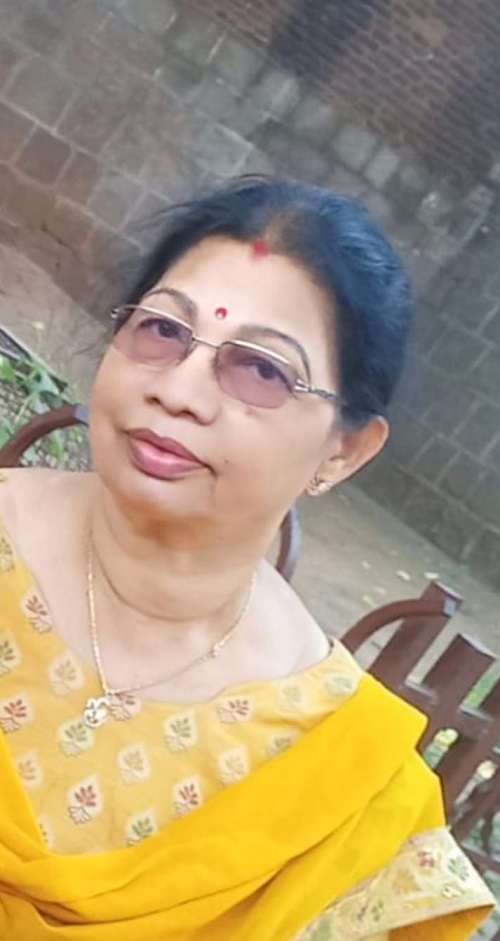
Professor Dr Bidyutprabha Gantayat is a well known and acclaimed writer, poet and translator of odia literature. She belongs to Odisha, lives in Bhubaneswar. A retired professor in chemistry by profesion. She writes in Odia, Hindi and English and translates to and fro in four languages namely Odia Hindi English and Bengali.
She also pens childrens literature. She has published 18 books on all the above category of literature to her credit. Among her significant literary work the translation of Gyanpeeth awardee Mohadevi Verna's poems, short stories and essays form Hindi to Odia and published books. Since 2014 she regularly publishes The Japanese format of English poetry ( haiku poetry ) in different poetry groups of social media worldwide. Published and earned accolades.
She has also been honoured and felicitated by different litrary organizations of the state.

As you meander
through a foggy path
in an early winter morning
your dark face slightly contorted
and knock at my door
with a worn out smile,
I would languidly welcome you
with a forced grin,
ask you to sit on my couch
and make yourself comfortable.
You would be staring out of the window
whistling a soft tune,
ask me to hurry up as
we had to walk all the way
through plains and hills,
jungles and meadows
in light and darkness,
I would laugh and blurt out,
I didn't finish all my chores
and need some time, you know.
You would be fidgety
ask me to hasten up,
why didn't inform me before hand,
I would complain,
I was waiting for you with a beating heart for months and years.
I had informed you several times,
yet you didn't get prepared,
a dunce as you are,
you yell.
Is the road quite tough, I feebly ask,
I am weak and tired, can't catch up with you,
if you stride forward with your long steps,
thanks a lot for your kindness in coming to my humble abode,
should we return or settle in that
distant land for ever?
You'd look at me quizzically
and say, no one settles ever in a fixed place,
we revolve.
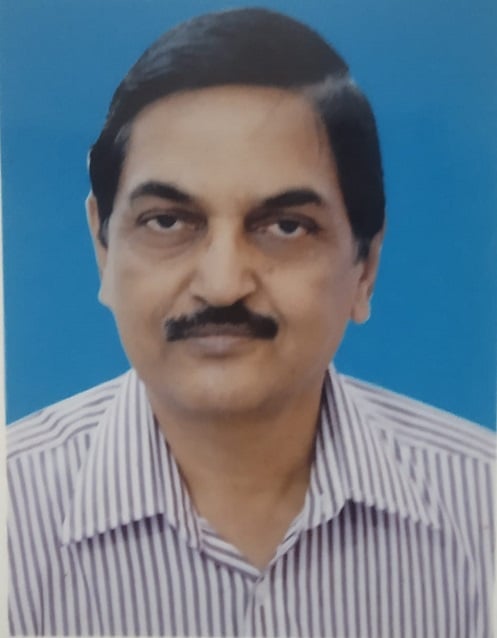
Pradeep Rath, poet, dramatist, essayist, critic, travelogue writer and editor is an author of ten books of drama, one book of poetry in English, 'The Glistening Sky', two books of criticism, two books of travelogues and two edited works, Pradeep Rath was a bureaucrat and retired from IAS in 2017. His dramas, compendium of critical essays on Modernism and Post modernism, comparative study on Upendra Bhanja and Shakespeare, travelogues on Europe and America sojourns, Coffee Table book on Raj Bhavans of Odisha have received wide acclaim. He divides his time in reading, writing and travels.

When it rained today,
It poured.
The shemozzle
That quitely brewed up
In the bust over ages,
Burst all it's catchments
In a go.
Today when it rained,
It poured.
The reverberating ripples
Inside turned to tides.
Breaking the barriers of
Time and space.
It poured today,
When it rained.
Donning the cloak of silence
The sedimented sentiments tremored
Echoing the rhytm
Of the lullaby on my lips
Enveloping my entirity
Your essence emnating from
The soaked moments
Like a lightning ran into my veins
No sooner it rained
It poured.
The moments of farewell
Took me astray
Ushering me into your being
Your utterings sozzled my
Existence to point of no return
My efforts to unyoke
Stirred me to merge
From the threshold of climax
I rescued the inevitable
With a batterd smile and
A few tears drops on your bosom
When it rained today,
It poured.

Nisha Luthra is a Film and Theatre Director, Poet and Playwright. She is the Founder and Director of The Narrators Performing Arts Society, India. She is also the Head, India of the Leinster School of Music and Drama, Ireland. She is also known for her book, Uns which is a collection of her Hindi poems with varied themes like, love, human relations, art and artists. The book is being translated into multiple languages and will be available soon for the readers.

My sobs mingle in the surround sound
when I nosedive like a kite to kiss ground
the sense of frenzy
fills my core with sorrow and fear
as I am ripped off layers of insulation
Is this a dense feeling of love ?
skewed frame of picture
or, am I heading towards
an emphatic non- negotiation?
your retracted steps
from promises of yore
makes me toss
on the waves of distraught
but I need to learn to be patient
yet be defiant to pecking order
at this juncture
fabrications of the past
slide through mind
pinch me hard
nudge my reckoning
and I emerge wise
count on reasoning
“you shall not go scot free dear!
as no one has ever ”
hope the ripples of time lulls me again
helps me boost sagging morale
heals and mends all impairments
the deep cuts I wear
the fretting worries
I have undergone
flow of life will seal
but, I cannot say
when and how .
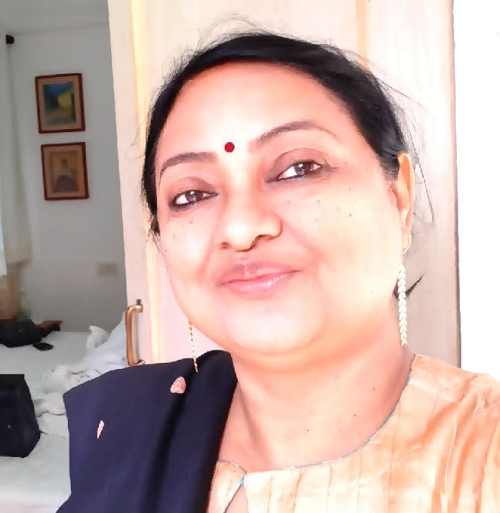
Sujata Dash is a poet from Bhubaneswar, Odisha. She is a retired banker. She has three published poetry anthologies(More than Mere-a bunch of poems, Riot of hues and Eternal Rhythm-all by Authorspress, New Delhi) to her credit. She is a singer, avid lover of nature. She regularly contributes to anthologies worldwide.

Are you able to see the light?
The light beneath your eyelids
The dazzling sun rays amidst trees
The motherland holding with care
and spreading equally everywhere!
Are you able to see the light?
The light through the window pane
The dim light through thatched huts
The homeless kids hold them with love
and teaching the value of darkness!
Are you able to see the light?
The light from the darkened sky
The light from the twinkling stars
The mothers holding it with a wish
and filling their babies’ glittering eyes!

Are you able to see the light?
The light from the gentle tidal waves
The light from the moonlit bright sky
The fishermen holding it for a cause
and showing the sailors the right path!
Are you able to see the light?
The light from an educated person
The light from the core of his heart
Rich not, poor not, the only human, he
who spreads the light of wisdom anywhere!
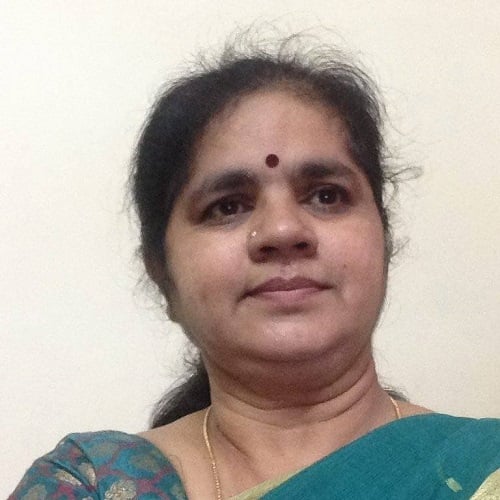
Mrs. Setaluri Padmavathi, a postgraduate in English Literature with a B.Ed., has been in the field of education for more than three decades. Writing has always been her passion that translates itself into poems of different genres, short stories and articles on a variety of themes and topics. She is a bilingual poet and writes poems in Telugu and English. Her poems were published in many international anthologies and can be read on her blogsetaluripadma.wordpress.com. Padmavathi’s poems and other writings regularly appear on Muse India.com. Boloji.com, Science Shore, Setu, InnerChild Press Anthologies and Poemhunter.com

In the dusky night sans the glory of the moon
The Earth glows with chains of light
Like a garland, diyas adorn lonely twilights
Folks from all walks of life come and join the glaring sight
The waiting is over for the helpless
With the grace of the Goddess,
Evil will be repelled soon
The air is set with glaring fireflies
Everywhere, there is pleasure.
Crackling fireworks signal the victory of good over power
Demons fade away in the dark sky with the presence of the Goddess
Ma Kali adorns the stages
By affirming our lost faith in goodness
Diva assures her mighty prowess
Chanting of mantras echoes everywhere to purify the air
Dazzling lanterns reaffirm the ray of hope
By lighting the lamp, the young bride prays in a distant village
Angels from Paradise bridge the gap to witness the splendor
Divine beings grace the celebrations
Through prayers, ancestors are pleased
And triumph of truth over injustice signals a change
With the advent of the wintry waves
Days become short with long nights
Illuminating lamps bring glory to each cottage of our nation
Here comes the festival of lights
Gifts, sweets, and love flood from everywhere
Rangoli from each floor doubles the warm desires
On the banks of the Ganges, Diyas sparkle like a cluster of stars
In warm embrace, " dancing souls" celebrate the joy of being together
Let each star reflect and twinkle like a bright flower
While multiplying the glory of tiny earthen lamps
Shiny stars sparkle in the sky like bright crackers
Let us spread the hues of love and care!

The dried, withered roses
Symbolic to my essence
Once upon a time, I was blooming like them
But now, the vicious cycle of life altered my name
Once, a beautiful damsel in fame
Now, I crave for companions to fill my vacuum
In my solitude, I cry and scream
No one is there to listen to my melancholy
I am abandoned and lonely
The petals of my glorious days have deserted my essence
In a ruined state, I yearn to create a sublime story
I desire to sublimate to Divine glory
This will be my eternal existence
Now, by leaving my past, I wish to dance in an oblivious reverie,
Maybe I will fail in this dreamy test,
Let me tread on the untrodden path to create a history
But like the eternal fragrance of roses
Everywhere I aim to scatter my undeterred muses...
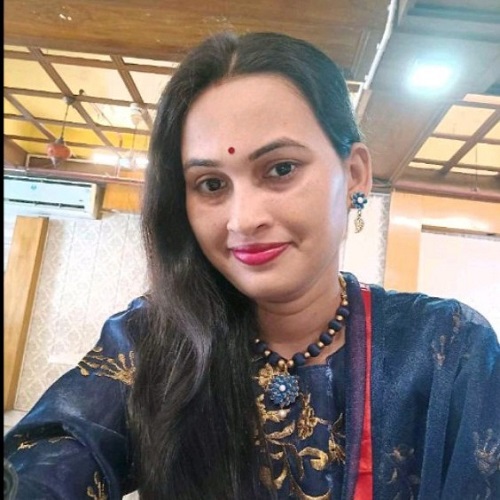
Sudipta Mishra is a multi-faceted artist and dancer excelling in various fields of art and culture. She has co-authored more than a hundred books. Her book, 'The Essence of Life', is credited with Amazon's bestseller. Her next creation, 'The Songs of My Heart' is scaling newer heights of glory. Her poems are a beautiful amalgamation of imagery and metaphors. She has garnered numerous accolades from international organizations like the famous Rabindranath Tagore Memorial, Mahadevi Verma Sahitya Siromani Award, an Honorary Doctorate, and so on. She regularly pens articles in newspapers as a strong female voice against gender discrimination, global warming, domestic violence against women, pandemics, and the ongoing war. She is pursuing a Ph.D. degree in English. Her fourth book, Everything I Never Told You is a collection of a hundred soulful poems. Currently, she is residing in Puri.

Love ?? stepped slowly to my life's
window with the glorious glamour
of milky pearly moon beam.
Weaving desires of pleasure, pampered
my droppy eyes with kaleidoscopic pieces
of dreams.
Syllables of fragrant love waved he to my
lonely ears.
Drenched my dry lips with his luscious buttery bites.
Tingling fingers in my messy mane engaged creating ripples of passion.
Warm tender movement on my tired listless body l enjoyed.
started I possessing him more and more.
Merged we to the sedated silence typing
Promise with our radiating eyes.
Wounds of soul, bruises of heart stopped
oozing blood.
Our embellished dreams laced with passionate passion turned to a bondage of
Pristine whole.
From a distant silhouette to a bundle of cuddle he became.
Stary heaven sensed l in a velvety pattern.
Basking to the warmth of his body and aroma of his breath , layer after layer opened my existence.
Our loving sweet union miraculously bloomed to a pink rose waltzing to the tinge of purple.
I changed from a silent Survivor to a free
wild dandelion.
Life started murmuring and nodding to the
cozy affair .
My love ?? sans possession turned my life's art and composition.
The priceless connection.

Own skeleton l love.
Fascination of 'I' by 'me'.
Shading aside the unnecessary
beautiful burdens l relax.
Real listless lustre a perfect transparency,
I love to synchronise.
Sonata of moon unreveals the arrival
of foggy winter.
Love the white mystery.
Cool, drowsy, droppy tingling sensation
for body and soul.
Warmth, a heavy unbearable burden.
I bare to encapsulate and absorb
the quivering foggy.
Trembling to my existence l enrich
own story on Earth.
No more demand of Spring.
Germination followed by hibernation
is a definite truth.
Waiting anxiously for a cosmic spark
to burn and mingle as Ash in my
own Silent Way.
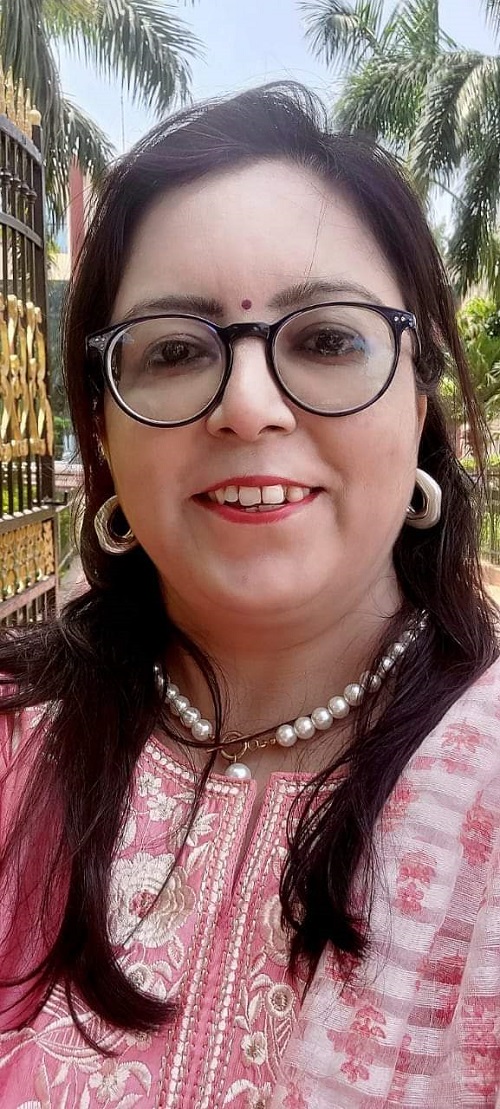
Bijayalaxmi Rath done masters in English from Utkal University Odisha. Works as PGT English St Xavier International school Bhubaneswar.
Multilingual poetess writes in English Hindi and Odia. Published in different anthologies like Durga, Rainbow of Eastern Sky',Toshali etc. Bagged Gujarat Sahitya Academy award, Rabindra Nath Tagore award etc .

Every day I see
the little change in you
how you grew up
from a tender sapling,
From young curled leaves
to bunches of greens,
From tiny buds
to a flower decked screen,
From fragile coils
to firm tendrils
oscillating in style
You are the vine,
An embracing figurine …..1
I see your amazing proliferation, The hope of being alive alone,
You crawl stealthily
and climb
I gaze you
with silent admiration…..2
I sans power
to penetrate
deep in to you
how enormous energy
is gathered by you
You prove your existence
You brush against odds
of scanty resource
You had perspired
You gushed for air
You moved happily
To thrive on this
troubled earth……3
I can’t decipher
the mechanism,
How you inspired me,
How the principles of thermodynamics work for me,
I get energised everyday
when I touch you,
The vives you give is infectious
I truly love you,
You,The Creeper Queen beautiful,
adorned with colourful flowers
of Krishna Kamal,
and delicious fruits of passion
I try to emulate
and grow like you
This is my dream ……4
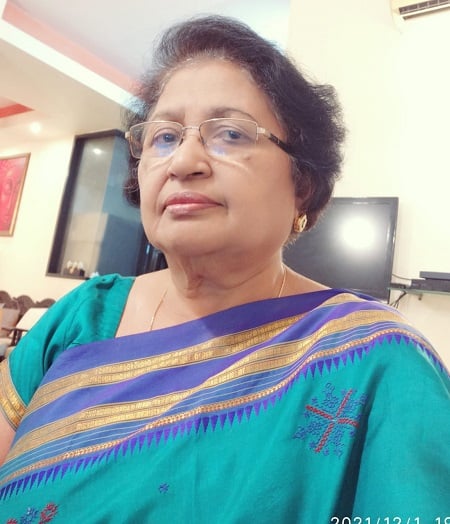
Rekha Mohanty is an alumni of SCB Medical College.She worked in Himachal Pradesh State Govt as a medical Officer and in unit of Para military Assam Rifles before joining Army Medical Corps.She worked in various Peace locations all over India and Field formations in High Altitudes.She was awarded service medal for her participation in Op Vijay in Kargil.She is post graduate in Hospital Management and has done commendable job in inventory management of busy 1030 bedded Army Base Hospital ,Delhi Cantonment for six years and offered Sena Medal and selected for UN Mission in Africa.After the service in uniform she worked in Ex Service Men Polyclinic in Delhi NCR till 2021.She writes short stories and poems both in English and Odia as a hobby and mostly on nature.Being a frequent traveler,she writes on places.She helps in educating on health matters in a NGO that works for women upliftment.As an animal lover she is involved in rehabilitation of injured stray dogs.
She lives mostly outside the state and visits Bhubaneswar very often after retirement.She likes to read non political articles of interest.She does honorary service for poor patients.

Names change, not nature.
Renaming places and decor
cannot take our culture
back to its primitive form,
for things will not be the same again.
The best thing that history does
in its chronology of events
is adding ideas
and accumulating its wealth of alluvium
on which a wonderful civilization grows
and makes a beautiful and tolerant world.
All that I know, all that I care to know is:
I am a bi-product of all religions,
my conscience, my reasoning
unfolding the essence of my being.
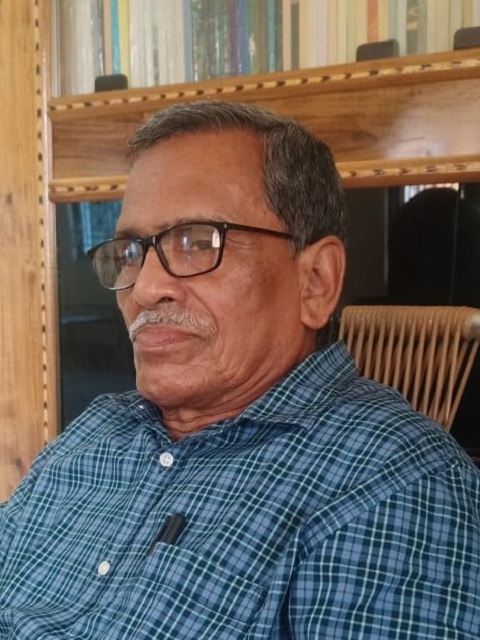
Bipin Patsani (b. 1951) has published poems in many prestigious journals and poetry anthologies including Indian Literature, Chandrabhaga, Journal of Indian Writing in English, Indian Scholar, Kavya Bharati, Poetcrit, International Poetry and Prophetic Voices etc. He has been translated to Spanish and Portuguese. He has three poetry collections to his credit (VOICE OF THE VALLEY, ANOTHER VOYAGE and HOMECOMING). He is a recipient of Michael Madhusudan Academy Award/ 1996 and Rock Pebbles National Award in 2018. He did his Post Graduation in English at Ravenshaw College, Cuttack in 1975 and served as a teacher in Arunachal Pradesh for 34 years till his superannuation in 2012. He also received Arunachal Pradesh State Government’s Award in 2002 for his dedicated service as a teacher. He lives with his family at Barunei Colony, Badatota in Khordha District of Odisha, India.

One more smile,
One more adieu,
Along the fog,
Sunshine and dew;
Time looks like a
Double swing door,
Years just get in,
But, no return-roar!
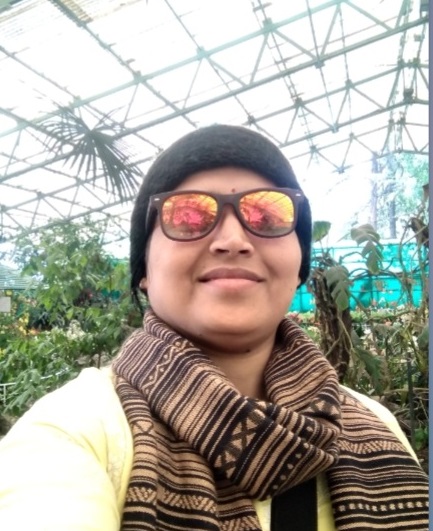
Anjali Sahoo writes poems both in English and Odia. Her first poetry book A Tryst with Thunder (2021), published by Authors Press, New Delhi, sheds light upon manifold aspects of life. They take the readers to the world of imaginative vibrancy, unearthing hidden mysteries of the world. Her published works include three poetry books and two short stories collections in Odia.

I grieve to see Mother Earth in pain
Her sorrows are innumerable
The green earth is turning grey
Due to deforestation and pollution
Forests are being cut down by leaps and bounds
Infinite creatures are on the verge of extinction
Air, water and sound pollution
Plastic is found in the oceans, a threat to marine creatures
I grieve to see Mother Earth's agony
Continents are retreating and intersecting
Glaciers are melting
Landslides killing men suddenly
Seasons changing
Facing the extremity everywhere
Of nature and humanity
Save the Earth, save the Universe
It is exploding silently
O Mother Earth,I wish to love you
Protect and save you
You caress life
How destroy your magnanimity???

Today's good acts
Will return to you invisibly
Today's harsh words
Will bounce back,someday
Think before you act
Everything returns...
Today or tomorrow
It is never too late
As you sow,so shall you reap
Luck may shine anytime
Good, better, best
But always do good
Whenever you can
Whatever you can
Wherever you can
If you desire to achieve goodness.

I am selling multifarious flowers
Since aeons
Past generations have also been
Doing the same assigned task
And multitudes
From all over the city
Pour in to buy the flowers
To offer and appease 'Him'
My flowers are reaching 'Him'
Anonymously
The sweet, scent of marigolds, hibiscus, lilies reaches everywhere
A little song of devotion, worship, prayers is in the air
But my fate is just selling flowers
In the cold, heat or rain!!!!
Poor me! There's no other destiny
How should I love Thee?
I do not know
How should I worship Thee?
Where should I place the flowers?
On Thy Head or Thy Feet?
How should I bow down
On partial or complete feet
I do not know
Forgive my weariness, cravings, sins
Wash me with 'Thine' divine blood
And make me simply a flower to serve 'Thee' diligently
And wither at Thine Feet, ignorant blissfully.
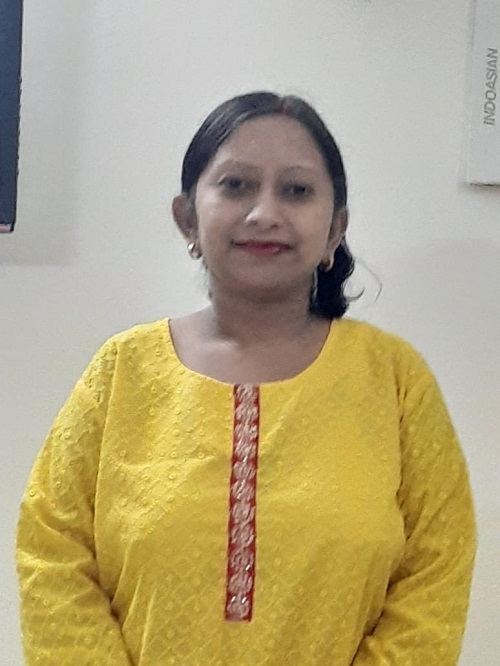
Ms Gargi Saha is a creative writer. She has published two poem books namely, 'The Muse in My Salad Days 'and 'Letters to Him '. Recently been awarded the Rabindranath Tagore Memorial Award and the Independence Day Award for poetry. Presently she edits several scientific research papers.

We imagine, want too
A peaceful world
There will be,, ideal, imaginary world
Peace and love come from within.
Peace is most burning desire of the world
Most talked about subject, about the world
Many" Peace summits" conversation going on
But in vain, all don't agree just goes on
Influential countries come with the solutions
Discussions but postpones for next summits
The world is so desparate about the peace
Powerful nations, plan War, to maintain peace
How funny..!
Never bothered to know
Real meaning ,real sense
Don't know, peace demands
Complete understanding
and acceptance
Concept of societal friendship, harmony, in absence
Of conflict, hostility and violance
Peace is relationship of mutual understanding
It is freedom from any negative thing.
No existence of peace without satisfaction.
Look at your self, too
Look at yourself......
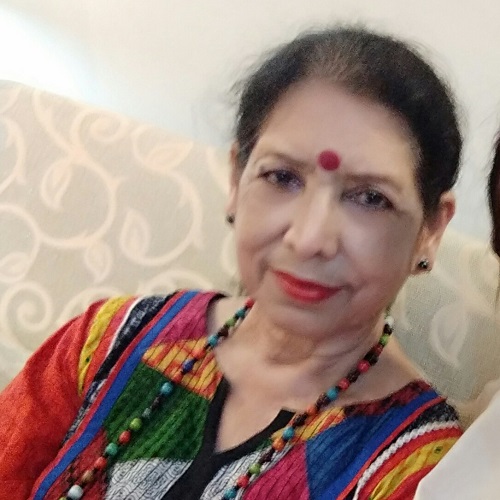
Manjula Asthana Mahanti is a post graduate in Sociology and Hindi. Her Graduation was in English honors. She is a Sangeet Prabhakar (vocal) and has done her B. Ed. She worked in a college as Senior Lecturer. Her last assignment was that of a high school Principal. She lives in Forest Park, Bhubaneshwar, Odisha, India.
She is a published trilingual poet, author, editor, translator and story teller. She has eight collections to her credit along with a long list of participation in national, international anthologies, e-magazines, etc. She is a recipient of several national, international awards, Samman Gujarat and Telangana sahitya akademy award amongst many more. Her recent award was "Icons of Asia"
FOR ONE LAST TIME
Nandini Mitra

I walked miles after I woke up from slumber ,
Then reached at your doorstep for one last time,
My tired legs didn't give up,
For one last time I wanted to smell your breath,
So deep,so clear,
I've come with the desire to walk by your side
For one last time ,
Listen to your heartbeat for one last time,
Let's laugh in abundance,
Sing the songs of our hearts,
Dream as if all things are possible,
Sing with our eyes and lips for one last time,
The blue sky above us will spread endlessly while smiling down
For you and me, for one last time,
We'll swoon at the starlit azure drunk with beauty,
Listen to the rhythm of the pounding waves for one last time.
You'll wrap me up in your love for one last time,
Kiss my dreams for one last time,
For one last time you'll whisper in my ears
All that I want to hear ,
For one last time I'm at your doorstep
With a bouquet of wishes,
Wishes neatly folded and hidden in my heart.

Nandini Mitra is a poet based in Kolkata. A post- graduate in English Literature from Jadavpur University. She is in the profession of teaching for last twenty -five years. She has published her first book of poetry,The Road To Tranquility, recently. Has worked as a freelance journalist for a prestigious Bengali magazine published from Kolkata. She is passionate about Music and is a trained classical singer. However, writing poetry has become an integral part of Nandini’s journey of life since 2011. She believes in the religion of humanity, compassion and love. She has a rich sense of metaphors and imageries and enthusiastic about weaving poetry relating to the realities of lives and the diversities of nature. Her poems have featured in various national and international anthologies.

I wish I were a peacock feather,
I would be meditating in your hair locks forever,
Let those scarlet red, glossy saga seeds at your feet remind you how my heart bleeds,
Didn't you make me feel through my dreams,
that you are the epitome of strength for me to survive extremes?
My Vrindavan is searching for thee in my memories today.
Sitting in a corner,I was trying to forget you and the infinite distance between you and me,
but I know your invisible intimacy when you touch my soul with your seraphic fingers ,
Now I realise that it is justifiable to forget you , cause I myself make believe ,I am only you ,
You can walk in like a dream from beyond the senses to touch me and drench me in this realm.
Golden shower blooms beyond fail,my unending waits prevail,
without disturbing anyone's sleep,with the coolness of sandalwood on my forehead, I cannot wait to sleep,
Hoping to wake up to the temple bells and conch sound along with the dawn drizzles.
I Still search for my desires to come true in every wet drop of the rain.
My spring returns from the deciduous ridges, waiting to bloom for another month of April season.
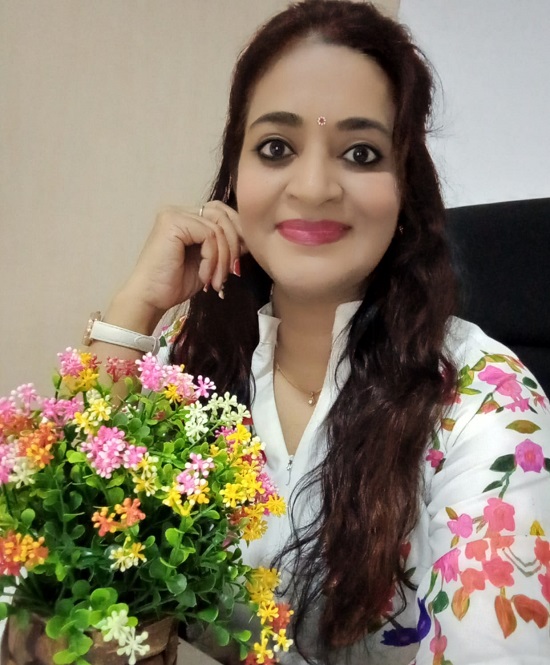
Born in Jammu and brought up in Delhi ,Leena Thampi is an articulate writer who's lost in her own little epiphanies and she gives them life with her quill. She's an author extraordinaire with three books to her credit -"Rhythms of a Heart", "Autumn Blaze" and An Allusion To Time'. She has many articles published in India and abroad. She has received many elite accolades from different literary platforms worldwide.
She has been awarded by Gujarat Sahitya Academy and Motivational Strips twice for her best contribution towards literature in the year 2021 and 2022.She was also the recipient of Rabindranath Tagore Memorial literary honours 2022 by Motivational Strips. Her work mixes luminous writing, magical realism, myths, and the hard truths of everyday life. Besides her flair for writing and deep-rooted love for music, she is an Entrepreneur,Dancer,and a Relationship coach She is currently working on her fifth book which is a collection of short stories.

Time flies age is just a number
Says he, what lies in a name
It’s just a plain calling gender
Oh come on! blushed her facial frame
Level nine to six crossed in a moment
From forty five to thirty five travelled within second
She panted, wearied for the euphoria surmount
A momentous, timeless story out to be a legend
He negates, debarred, rejected hated age bar
A big ‘No’ to a deep ditch or mountainous age gap
Her deep down feelings for him only matter
His emotions for her sprouted in sap,on belief a slap
Love is the only basis of their unconditional support
Looked each other’s mature heart where love prevails
Nourished their unaffected sublime caressing inclination in heart’s fort
Welcomed, greeted, accepted,ageless love and hails
As if a Time Machine put them in a timeless eon
Where time, span, moment, memory fades n no entry
Where soul mates and heart meets, body neon
They glides soars, fly high in world of own, be own sentry
Scripted, communicated in a language of heart’s core
Skilled in love’s literature, ornamental oratory of life’s drill
Sculpted,carved chiselled embroidered ashore
Sketched, drew, splashed, painted coloured life’s ordeal
Timeless journey unending endless incessant ceaseless
Powerless time, no tarnished no decay no melt no wilt
Powerful love stood like a guard against wings of time merciless
Their immortal fondness, supreme tenderness,delightful passion ever built

Sheba Jamal is a prolific writer in English and Hindi. She works as an English teacher in a high school in Patna. Her mother is a literary genius in Urdu literature.
Sheba has a penchant for creative work. Despite her hectic schedule she finds the time for creativity. Her writings include poems and short stories - both in English and Hindi - which are published in various national and international anthologies.

I thought ,I knew
I thought they knew not ,
I was going to kindle the fire,
To warm them up ,
Light the candle, to enlighten them ,
How little I knew that my exercise was in vain,
How true was it that I was going to stuff them with knoeledge?
But the knowledge that dawned upon me so late
Was that nothing can be taught,
So was not my pride in vain ?
The pride that I was building something ,
Without which no voyage is possible ,
Nothing can stand erect ,
No one can dive deep into the ocean to find the pearls,
Why I chided the child
Who was not answering what I wanted to hear ,
When he or she remained silent or did bite the nails ,
Silently saying perhaps that silence was the best policy of those who know
The policy to hide their knowledge and test teacher’s temper
I got merciless in reprimanding the poor chaps,
If they whispered in the class finding odds in my diction or action ,
Was the Sky falling ?
For them I existed there
Not they for me
They loved the fun ,
I was the hindrance,
They were the compass
I was minus compassion
My collar was up , their faces were down , ,
But ,how in a few years they did ,
Which I would take lives to do
They out-classed , outsmarted me,
They soared in the Sky ,I perched on the Earth
That made me happy , but sad that I did not know
The metals they were or the gems in them
But they were generous to recognise and bow for what I was not,
To make me burn that I did not know anything ,
At least I did not know them !
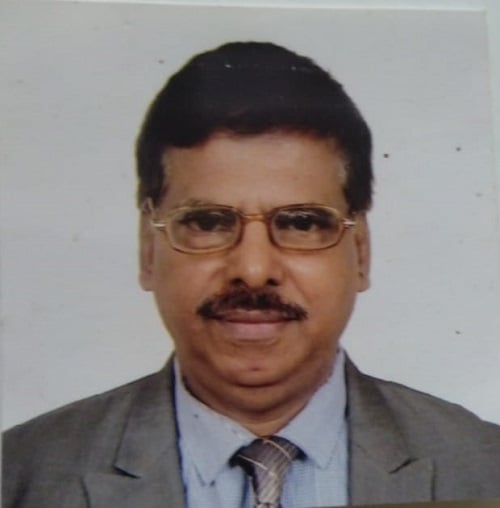
Dr. Niranjan Barik is a retired Professor of Political Science from Ravenshaw University, Odisha and is currently attached there on teaching and research on an ICSSR project. He is passionate about literature and writes poems, short stories.

Mind and body were at loggerheads.
Heads, you win! said Mind.
Want to know the score?
Stop throwing medium-pace,
spin and bouncers,
body screamed,
raging at hundred and three.
You’ve a free ticket to travel anywhere at will
The toll tax is always upon me
Body continued the tirade.
At a distance,
an ambulance siren screamed long and loud.
A feeble voice uttered: Rest, some rest!
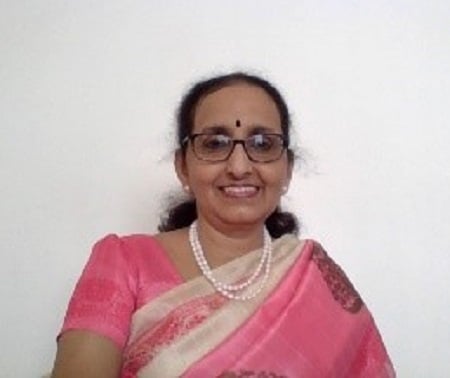
Hema Ravi is a poet, author, reviewer, editor (Efflorescence), independent researcher and resource person for language development courses... Her writings have been featured in several online and international print journals, notable among them being Metverse Muse, Amaravati Poetic Prism, International Writers Journal (USA), Culture and Quest (ISISAR), Setu Bilingual, INNSAEI journal and Science Shore Magazine. Her write ups and poems have won prizes in competitions.
She is the recipient of the Distinguished Writer International Award for excellence in Literature for securing the ninth place in the 7th Bharat Award, conducted by www.poesisonline.com. In addition, she has been awarded a ‘Certificate of Appreciation’ for her literary contributions by the Gujarat Sahitya Academy and Motivational Strips on the occasion of the 74th Independence Day (2020) and again. conferred with the ‘Order of Shakespeare Medal’ for her writing merit conforming to global standards.(2021). She is the recipient of cash prizes from the Pratilipi group, having secured the fourth place in the Radio Romeo Contest (2021), the sixth place in the Retelling of Fairy Tales (2021), the first prize in the Word Cloud competition (2020) and in the Children’s Day Special Contest (2020). She scripted, edited, and presented radio lessons on the Kalpakkam Community Radio titled 'Everyday English with Hema,' (2020) a series of lessons for learners to hone their language skills. Science Shore Magazine has been featuring her visual audios titled ‘English Errors of Indian Students.’
A brief stint in the Central Government, then as a teacher of English and Hindi for over two decades, Hema Ravi is currently freelancer for IELTS and Communicative English. With students ranging from 4 to 70, Hema is at ease with any age group, pursues her career and passion with great ease and comfort. As the Secretary of the Chennai Poets’ Circle, Chennai, she empowers the young and the not so young to unleash their creative potential efficiently
WOMAN –HER UNIQUE TOUCH WITH EMOTIONS

SHE baffles every time,
May be an enigma never solved?
SHE, a fantasy!
SHE, a reality!
Life’s ebbs and flows,
Beautifully SHE embraces,
With a smile on her lips,
SHE illuminates.
Some scars make her nights dark,
Bruises to mend,
Tears and fears to prevail over,
Thoughts so temperamental,
Yet, SHE wins over depression,
Soaring high ferociously like an eagle,
SHE fights the battle every day.
Love doesn't come back like a boomerang always,
Unrequited love is bittersweet,
For love's resilience knows no bounds or fears,
SHE has been entrusted,
SHE is a mess-somedays,
Some define her with words,
Some words choke her brain,
Some thoughts leave an excruciating pain,
Yet ready to explore,
The labyrinth of life’s roads and passages,
Her fortitude blooms,
Celebrating the goodness within,
With her integrity and compassion,
SHE never disappoints,
With gems to thrive,
SHE dares to fly with a positive attitude every time.
The artist in her,
SHE paints all over her canvas of life,
Pouring her heart into colors,
SHE detaches from the things and people that exhaust her,
Irons the wrinkles, buckles up,
Awakening the transformation within,
Rays of hope radiate in her art,
With a gleam in her eyes,
SHE dances with gaiety,
Emanates a better version of her,
SHE has the power within.
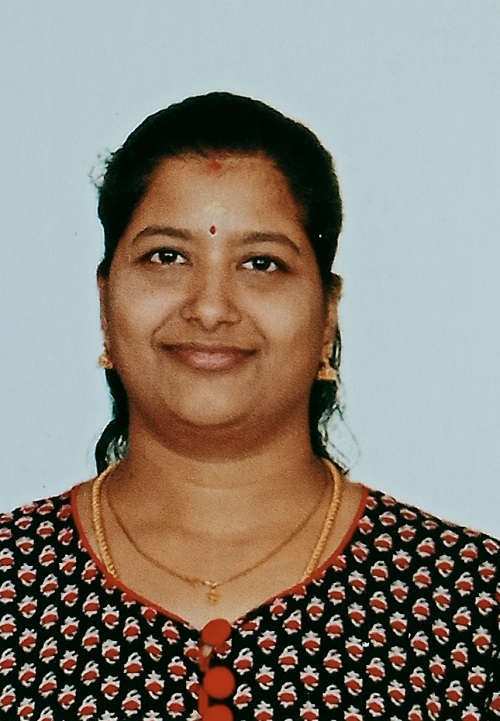
A cheerful Biochemist and Molecular Biologist, Dr. Thirupurasundari C J (Dazzle) has a university rank and gold medal in her Bachelors and Masters respectively. She started her research and teaching experience at a Diabetes Research Hospital. She is recognised as someone who teaches with passion. She took this ethos to a school and also excelled as an Assistant Professor at a reputed University, Chennai, and then for a brief stint at the Vector Control Research Centre, Puducherry. She has PG diplomas in Bioinformatics, Clinical Research and Patent Rights. She has published her research findings in peer-reviewed journals. Cancer, Diabetes and Horticulture are the fields, she has traversed. The last of which was put to use at the Indian Institute of Horticultural Research. Her other passions include yoga, sudoku, poetry, sketching, gardening and experimenting with new cuisines.
Besides being a science content writer, an editor for the “Science Shore” e-zine, she has published her oeuvres in Bangalore Poetry Circle, Adisakrit, Positive vibes, Chennai Poets’ Circle, Indian Periodicals, International Writers Journal, Inner Child Press International, INNSAEI, Spillwords and other anthology groups. Her oeuvres are also available on literary platforms like TechTouch talk, Cultural reverence, Namaste India, Muse India-Your Space, Story mirror and others.

Life is all about ups and downs,
with smiles and frowns.
I face it with a kind heart.
Walking through the Uncanny paths,
Enjoying the ebbing spirits of power
realizing the flow of life,
Understanding what life is!
I find my mind happy and peaceful
while dancing,
I have danced in many venues.
I am proud to recollect...
For my inborn passion destroys pride,
I am realizing the Ups and Downs of Life.
That art should not be viewed with pride.
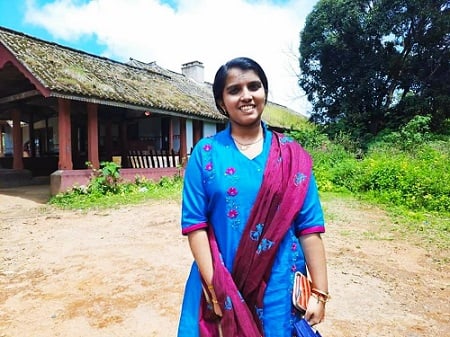
Sukanya V Kunju is a postgraduate in English language and literature from St.Michaels College, Alappuzha. Most of her poems have been published in Literary Vibes. She is an aspiring poet. She is the co-author of the book Dusk and Dawn.
THE STRANGER
Mrutyunjay Sarangi

The man who followed me
Like a long-forgotten shadow
Creeping through my closed doors
And sitting on a dust-laden chair.
He filled the room with an unfamiliar odour
That made me choke with craze
An unlit cigar dangled from his lips
Like a limp hand from an oversized coat.
His right leg dangled at an odd angle
Like a loaded gun
Aiming to take a shot at me,
At my frail emotions, my wounded soul.
He stared at me like a half-lit bulb
Emitting a small strand of light,
But tons of mocking casualness
And an all-pervading emptiness.
Questions hung from his eyelids
Like shredded pieces of a mosquito-net
That I had put aside years ago
For failing to filter my dreams.
As the lamps were lit on the streets
Filling my room with faint glimmers of light
As weary office-goers returned to their homes
And the noise outside grew to a cacophony.
As the night enveloped the town
Like a burdensome smog
I could hear crows cawing
And an odd beggar crying for alms.
As shivers ran down my spine
I stared hard at him,
Waiting for him to say something or leave
But he made no move to go.
He probably had come to stay
And be a part of my remaining life
Ah, the stranger! The unwelcome bundle
Of my unfulfilled fantasies!

Dr. Mrutyunjay Sarangi is a retired civil servant and a former Judge in a Tribunal. Currently his time is divided between writing poems, short stories and editing the eMagazine LiteraryVibes . Four collections of his short stories in English have been published under the title The Jasmine Girl at Haji Ali, A Train to Kolkata, Anjie, Pat and India's Poor, The Fourth Monkey. He has also to his credit nine books of short stories in Odiya. He has won a couple of awards, notably the Fakir Mohan Senapati Award for Short Stories from the Utkal Sahitya Samaj. He lives in Bhubaneswar
Critic REVIEW
THE SPECIAL PUJA ISSUE (2023) OF SHORT STORIES
TESTING TIME by Geetha Nair G
The story exploded with a cruel tease or blubbering from the mouth of her beloved mother for her elder daughter, Vasuda, “Your father isn’t really your father. You’re my love-child.” Vasuda was mortally shocked in spite of knowing that her mother had almost lost her mind. But as expert story-tellers they are, they do not openly moralize as in Vishnu Sharma’s legendary Panchatantra stories, but make them subtle for the reader to feel them in his viscera.
The rest of the story revolved around Vasuda’s sad inquiry and analysis to believe or discard her mother’s devastating statement that her father was not her real father. She started doubting her father’s gestures of affection towards her. She, in hind sight in her anxiety, even discovered imaginary extra love and affection of her father towards Janaki Amma, her sister, compared to her. It never struck to Vasuda that there might be other reasons. Like, the sister’s physical disability might be the reason.
Vasuda would never know why her mother had played the cruel joke on her. Was it because she had totally lost her mind? Though, her inner storm had subsided after the DNA report confirmed that the man whom she addressed and loved as her father had been her sire also, and so, she was not her mother’s child out of her extra-marital affair.
This climax at the DNA report was like a soft and sharpened pencil tip breaking, she knew the pointed tip could no more wound, but the wound would stay, though in another form. On her day of revelation, she found her mother turning into another person, a small child with a new avatar.
The quotable metaphorical line, “Cuckoo in his nest”, exactly suited Vasuda’s tormoil, and philosophical outburst, “Knowledge is pain,…… knowledge is loss as well…” syncs with Vasuda’s pain and loss. These exact imagery highlight Geetha Nair G’s expertise and style in story writing.
DEVI by Sreekumar Ezhuththaani
The story was a simple exchange between a puny and otherwise very ordinary looking lady, simplicity incarnated, on one side and on the other, a linguist who was impressed by the simple lady’s correct pronunciation of Malayalam words that needed dexterity of movement of the tongue, lips, palate, and gullet etc. The techniques were expressed in the story by jargons, like ‘fricatives’ and ‘plosives.’ I had to look into Google data-bank to know meanings, but only inadequately, just skin deep. But he was impressed by the lady’s simplicity in spite of her erudition.
He found out that she taught students and also writes stories and poems for children. Though, she was ill-treated by the Bank’s lady manager from whom she wanted a small loan, was harassed by the corrupt education department, her school authorities, and the corrupt administration, but she was not a bit bitter. She accepted the trial and tribulations with great grace and positivity. In her goodness, he found godliness, his goddess, he was planning to go to the temple for having a darshan. He felt he was in the Devi’s presence.
Author Shreekumar in the story passes many social messages without being loud. One can have God in humility and honesty. He also, speaks on corruption, misuse of power, and on the other hand, holding one’s peace on the face of crushing trials and tribulations. Also, a soft message from him to his Malayali fraternity not to mispronounce the lovely mother tongue and wound the Devi of Language.
DYING DECLARATION by Ajay Upadhaya
The story is special in the collection because a human being thinks from the position of a little baby rabbit, and the thoughts sound so real.
A heartrending tragedy, and a tearjerking rendition from a baby rabbit, out in the wilderness alone with a spirit of adventure, feeling guilty of disobeying mother’s warning that it was too young to move out alone. A tragedy struck, while crossing a road, it came under the wheels of a vehicle and got fatally wounded.
Rest of the story was the little wounded rabbit’s soliloquy, repenting its own unruly behaviour, disobeying a loving mother’s sage advice, and also about mysterious human behaviour, a mixture of cruelty and kindness. It was beyond the kid’s grasp, why humans were so cruel that drove over animals, or hunted them as game for pleasure.
But the little dying one had also a few kind words for other humans who loved animals like their own children. She recalled the kind woman who lifted its broken body carefully with affectionate fingers and carried her in her lap and then her kind daughter taking over from her to save it from dying. But it was too late. But before breathing its last the little baby rabbit was moved by the girl’s kindness when she cried over it because she felt the baby rabbit was dying.
Though not articulated Ajay’s message is clear and loud, we humans should be kind to the suffering, be they humans or animals. The story is a treatise on animal love.
KAMADHENU, A SAGA by Prabhanjan K Mishra
Among the twelve story-tellers most of whose names read like from a ‘Who’s who list’ as per their literary profiles, there is one ‘who’s that’, or ‘Who is he’, that is yours truly. I have a story here also. I will not critique it and leave it to its readers to judge. I would only narrate its core that is no fiction.
An ordinary and old Indian cow, Kamadhenu, has traced her life from her early happy years to her last days spent in misery. Her happiness over the new well-intentioned Cow-welfare law was short-lived. She and her peers became victims of the law’s misuse. The misuse came from vandals, over-enthusiasts, and the vested-interest gangs. The law enforcers remained oblivious and silent observers to the misuses, might it be for their callousness, wrong-interpretation, directions of their political bosses, or greasing of palms. The Kamadhenu moved from a shed in an affectionate and caring home to a ramshackle hut in the slum area, and then to the streets for foraging food from garbage dumps like millions of her peers, victims of the same misuse of a good law. They often in their hunger-pangs entered fields of standing crops and vegetable patches of farmers and became a national menace.
A story of animal cruelty, indifference, torture and riches-to-rags story involving a Gau-mata in India where the majority population believes that the entire Hindu pantheon, the thirty-three crores of gods and goddesses, have their presence in this sacred animal. In addition, nobody can deny that Gau-matas are not less, rather more nation-builders than Gandhi, Nehru, Patel and all others of their ilk put together.
DESIRES by Dilip Mohapatra
It is a soft satire-cum-humour on human greed for wealth and wellbeing vis-à-vis the Cosmic Grand Plan. Tapas, a householder, in his house-shrine, had stacks of old palm-leaf recording from his grand-grand-grand…granddad’s time, said to contain invaluable ancient wisdom.
On the auspicious day of Mahalya, the day when Devi Durga used to be invoked, he decided to start delving into those ancient wisdom. The first palm-leaf that he picked up contained the mantra of fulfilling wishes. Tapas wished to be the world’s wealthiest man but it was denied, also his wishes to make all the human beings happy, healthy, and peaceful. Because those wishes clashed with the Cosmic Plan. His wishes to fly like Garuda (Lord Vishnu’s eagle-transport) started converting him into a giant eagle and it unnerved him to go for its prescribed antidote. The story here turned scary like the famous ‘Monkey’s Paw’ of W. W. Jacobs, only that ‘Monkey’s Paw’ had no antidote.
The humorous climax came - Tapas asked to get rid of all desires and by that, as promised, be the benign lord of all what was worthwhile. But his wife disturbed his trance by asking him go to market to bring fresh fish for his favourite fish curry. From his prompt positive response, it would appear, Tapas was relieved that his desires to please his wife, and to eat fish curry were still alive. Also, it would appear he was happy to be the same worldly man as before culturing the ancient knowledge.
Dilip is a master of satire and humour and in that his story outshines all in the collected work.
THE HUMAN TOUCH by Meena Mishra
A story of futuristic genre, set a millennium ahead in Circa 3016 AD. Earth has been destroyed 1000 years behind that time by a celestial collision, but a single human being, Mr Right, has been catapulted into space to land in an exoplanet in a comatose state, and his well-preserved body was revived after the millennium by the settlers of the exoplanet.
On coming to senses from his thousand-yearlong coma in a strange land full of women, ruled by a woman, devoid of men, no blue sky, no green trees, but far-advanced in technology than the earth Mr Right knew. He was ushered to the presence of the ruler, Aphrodite, and expressed his indebtedness for saving him from death. But in return he was asked for his human-touch to revive a girl lying in coma. The girl was a very important to the exoplanet. With Mr. Right’s touch, she instantly recovered out of coma and Mr. Right was adequately praised for his help.
Then he was led to his room and came the scary part. His skull was opened like the lid of a container and his brain was taken out and kept in deep freezer.
This climax was unexpected, explosive, and scary. In a way, the story reflected badly on AI and too advanced a civilization. Great advances in technology might bring great inhumanity. It destroyed soft feelings and ‘human touch’. For the prophesy that the comatose girl could be revived only by a human touch even required the touch of Mr Right, an earthling. Perhaps too advanced civilisation on the exoplanet had made it soulless. It is a neat and fabulous short story with all its guns booming.
ANGEL’S ANKLET by Snehaprava Das
A young energetic woman LIC officer posted to Latur town, during her routine jogging in the early morning in the public park met a little pretty girl studying in second standard in a convent school near the park. They met on regular intervals.
The girl never smiled and sat on a park bench wearing a single anklet on her left foot. From here the story took a supernatural turn, as it was revealed to the young lady that the girl, Anjli, had died in an earth quake years ago. Her convent school was also grounded in the calamity. Anjli had had lost her anklet of the right foot during the quake.
Finally, time came to leave Latur on transfer and the lady had not met Anjli for days together. While in the park in a semi dark morning before departure and the park soil was wet because of a morning shower, she stumbled upon a buried silver anklet which was established to be Anjli's lost one.
The lost and found anklet was entrusted to Anjli’s father who had her other anklet already. In the next and last meeting, Anjli, dead for years, finally appeared wearing both her anklets, also wearing a happy angelic smile, a sign of fulfilment.
Perhaps the author is indicating Anjli’s attachment to the lost anklet, and its finding, the fulfilment of her last wish leading to the release of her soul. The most absorbing and soulful story of the collection with surprises and tragedies. Though what happened was inexplicable, yet that does not reduce the riveting power of the story.
NOTIFICATIONS by Pankhuri Sinha
The story is a soliloquy of a young woman. The title ‘Notifications’ is offbeat, only a point of reference to understand her anxiety. She holds notifications responsible for all the maladies in her life.
The young woman looked for her bearing, orientation, and identity. She also looked for a soulmate and a home built on love with him. She had recently been a migrant in a foreign country that she loves for its beautiful houses, streets, flora and fauna. She had a love story ending in a marriage that turned soulless over time. Once even had been raped by her husband whom she loved no more, and he entered her flesh roughshod. A marital rape.
She had then an extramarital lover, very good looking, a competent lover in bed, but having a baggage of an estranged wife and children, and therefore, would perhaps not be able for a permanent relationship with her. He would not allow her to pitch a permanent tent in his land of love.
She lost her job even if she had been qualified and competent. She lost marriage, work permit in the alien land, and had to return to her native town. Her second man, the new lover, vanished into thin air. But she is still obsessed with the beauty of her adopted land, went back there virtually through google satellite images. She virtually lived in her old dream town in that alien country where she had a nest, might that be gone apart.
In her native town and new job, she lived with nostalgia, feeling homesick for a home around love that and a soulful lover. She built that as well in her imagination.
The writer speaks her words like the breathless singer Shankar Mahadevan’s singing: melodious, deep-throated, and poetic, loaded with intimate moments and minds. She has a gift of romantic gab that makes one weep and laugh.
LESSON FROM JACKFRUIT by Dr. (Col) Rekha Mohanty
It is a hilarious story set in a time when the British ruled India. The humorous incident took place in a rural Police Station where a British officer was holding the charge, along with his Indian subordinates. A constable took leave to attend to his mother who was very unwell. At that time, a villager gifted the police station a ripe jackfruit from his garden. The subordinates out of respect sent the ripe jackfruit to their boss’ house. The ripe fruit was kept in the British officer’s living quarters in one of the unused rooms but by chance it skipped their minds to inform the boss about it. In the night, the British fellow was pulled out of his sleep by the sweet smell of ripening jackfruit. He had never seen a jackfruit or never tasted one. He found out the big fruit and started eating its fleshy part with both hands. He loved it, but the jackfruit’s mischievous gum got smeared all over him including his hair. To ger it out of his sculp, he had to tonsure it. The next day, the constable returned from leave and as he had lost his mother, he was also tonsured by Hindu tradition. The British officer made all, that were present in the police station, to break into guffaws, when he asked the tonsured constable, “Did you eat a jackfruit also?”
YA DEVI SARVABHUTESHU by Prof (Dr) Viyatprajna Acharya
The protagonist, Sandhya, in the narrative is also a female doctor like the author. So, the author’s narration about Sandhya’s treatment of the malady, the malady of the straying-love disease of her husband, was like a real thorough treatment. The treatment had sort of applying hot-presses (hot water bag), and cold-presses (ice pack), figuratively. Her straying husband, making an affair with a younger woman who in fact was a gold-digger, was adequately reined in back to her family-fold. For the achievement of that feat, she, sort of applied the Chanakya’s politics of ‘Saam Daam Dand Bhed’. She told lies, gave threats, pretended of detecting terminal diseases, etc. to win back her husband.
But questions still hang above Sandhya like many Swords of Damocles on which no light has been thrown. Wouldn’t her husband stray again? Is it Sandhya’s fault, lack of attention that made her man stray to forage the food for his love? What did cause him to fall out of sync in their love-game, a tested affair of so many married years? Were there too much of expectations, naggings, bad packaging and presentation, loss of the mystique, or similar other factors on her side. The good story would have been better, had these cerebral issues been reflected upon.
OFFERING THE OTHER CHEEK by Sujata Dash
A story about an innocent child of Standard Three, with a strict and disciplinarian father. Like most children of his age, he was irregular at homework, not very bright in examinations, and preferred savouries from vendors or the market to nutritious homemade food, and doing similar other childish antics.
His class-teacher was unhappy by those traits and sent a letter complaining to his father who took the child sternly. His father abused him in words and a resounding slap to a cheek. More beating and scolding were feared by the child. As his cheek that had received the slap had gone sore, he closed eyes and showed his father the other cheek. But the gesture changed the father’s perspectives. His father’s heart melted, and he became an epitome of affection.
At a later period, the narrator recalls he did a Gandhian Gesture even unknowingly. But that changed his father from a stern man into a kind and loving father. The simple story contains two power-packed messages, children should not be abused with words or corporeal punishments. And Gandhi was not titled a Mahatma for nothing. Mahatma’s non-violent methods were infallible. A good really story.
RED CHUDAA, PIZZA ITALIANO AND WHITE WINE by Mrutyunjay Sarangi
A story with movements and multilayers with a lot of scope for readers to interpret. A man, compared to Red Chudaa, the coarsest and un-polished variety of flattened rice, a homely food in Odia countryside, rose to the level of Pizza Italiano and white wine, representing a few of the things that spoke of high couture and standard of living. The former Red Chudaa was now capable of flaunting a world of high fashion and food.
The story about Sutanu, a rustic, untamed bull unleashed in a China Market of sorts, who came to study and live in the hostel of a college with smart Alec bullies who self-flaunted as the epitomes of smartness. The bullies made Sutanu the butt of every joke for his downmarket way of living and so-called uncouth behaviour. Sutanu suffered silently in the hands of bullies.
But after studies, the lady luck smiled on Sutanu and he returned in style with millions in bank account, a pretty modern wife on arms, and treating with disdain the same bullies, his former classmates and co-hostelers, who had looked down upon him in college days and had bullied him no end, but later in life, they had failed to make their mark in life.
A ‘rag to riches’ story. Sutanu takes his revenge just by paying back his tormentors with their own coin, by bullying them but subtly, by flaunting his wealth, style, fashion and high standard of living. He turns the table on his so-called ‘Alecs smart’ classmates and co-hostelers to feel like the poor dregs of his high-flown society.
The story has a quiet message - don’t laugh at someone’s misfortune, or look down upon any one’s humble background, as none knows how the future would pan out. A story with a lot of movement and surprises. (END)

Prabhanjan K. Mishra is an award-winning Indian poet from India, besides being a story writer, translator, editor, and critic; a former president of Poetry Circle, Bombay (Mumbai), an association of Indo-English poets. He edited POIESIS, the literary magazine of this poets’ association for eight years. His poems have been widely published, his own works and translation from the works of other poets. He has published three books of his poems and his poems have appeared in twenty anthologies in India and abroad.
BOOK REVIEW
Sreetanwi Chakraborty
A DROP OF GOLDEN SUN by Sohini Sen

Bibliographic information:
Name of the Book: A Drop of Golden Sun: Re-presenting Tagore’s Gitanjali
Author: Sohini Sen
Publisher: Penprints Publication
Year of publication: 2023
Language: English
ISBN: 978-819641774-1
Price: INR 300 | $ 40
In his seminal essay titled ‘From Art to Life’, Sankha Ghosh enumerates:
“The occasion of a single song is of little moment. What should concern us is the very idea of a particular song springing in simple causation from a particular episode of the poet’s life. For Niradchandra, the language of song can never be sensorily neutral…” (Ghosh 2)
Re-presenting Tagore’s Gitanjali is not just a daunting task, but it requires an indepth understanding of the various strands of emotion, multilayered connotations in poetry and the subtle art of transcending the boundaries of compositional elements. Sohini Sen, an Assistant Editor, a writer, and a travel enthusiast, has tried to immerse herself into the very concept of binaries of being and non-being. Under all those circumstances where Tagore is methodically deified and institutionalized every now and then, Sen’s fresh trajectory presents Tagore’s Gitanjali in an obvious amalgamation of the quintessential emotional outburst, with the rational disclosure of a distant prophetic tone. She has kept the 103 Bengali poems intact as part of this book, and it is a fascinating collection of the transcreation and the original Bengali poems. It is the profound impact of the real and the surreal that blend into an exquisite whole. Tagore writes:
“Tumi jakhan gan gahite bolo
Garva amar bhare othe buke
Dui ankhi mor kare chhalachhala
Nimesh hara cheye tomar mukhe.” (Sen 141)
and the transcreation goes like this:
“My heart swells with pride when
You ask me to sing,
My eyes mist over
When I gaze unblinking at your face.” (Sen 16)
There is no deformity of spirit or the nuanced ideology of one who discovers, one who has dedicated the self in complete, unadulterated passion to the Infinite. It is Sen’s ‘gaze unblinking’ that has all the aspects of surprise along with a serene, meditative indulgence of the human soul. Sen’s poetic photography, sense of image-building and reconstructing the exact sentiment through deft poetic strokes definitely marks a robust re-visiting of Tagore’s masterpiece. It is not the bystander’s approach or the easy chanting of the church hymns that mark the clustering and larger ramifications of her transcreation. Sen, on the contrary, enlarges the idea of Pantheism, and gleefully participates in it. It is in the joyous and effervescent festival of life, in the larger humanistic macrocosm. Tagore writes:
“Jagate Ananda yagne amar nimantran
Dhanya holo dhanya holo manavajeevan.
Nayan amar rooper pure sadh mitaye beraye ghure,
Shravan amar gabheer sure hoyechhe magan.” (Sen 152)
And Sen, an ardent observer of the tuneful mysticism, writes:
“I have been invited to the festival of the world
My life is truly blessed.
My eyes feast to their fill
In this beautiful place,
My hearing is immersed in profound tunes.” (Sen 30)
Like Keats who finds how a ‘thing of beauty is a joy forever’, Tagore’s philosophical renderings also circumvent how beauty is not a case of phantasmagoria but a compact instance of reality. There is an interweaving of the soul’s essence and the larger nature outside, with each drop of golden sun translucent and affecting the radiance of the soul. The harmony of the visual and the auditory elements in the choice of her poems become poignant with stories that have been told, and instances of life force that vibrate with the never-ending sense of rejuvenation. There is an elevation of the heart, with an instance of pious submission that is about an acceptance of the sublime truth. In Tagore’s words:
“Tomar kachhe chai ni kichhu,
Janai ni more nam-
Tumi jakhan bidaye nile
Neerav rahilam.” (Sen 188)
And Sen’s transcreation reads:
“I did not seek anything of you
Did not tell you my name-
When you sought to leave
I stayed silent.” (Sen 78)
It is the source of understanding of nature and humanism to a large extent, that permeates the whole of A Drop of Golden Sun: Re-presenting Tagore’s Gitanjali. The best part with Sen’s transcreation is that the aesthetic simplicity with which she portrays each of the poems is a rediscovery of the song offerings from the universal beauty found in harmony and symmetrical forms, and the individual beauty that we find in suitability. In Immanuel Kant’s the Critique of Judgment, there is a careful consideration of aesthetics where Kant evaluates the judgments of taste ‘that are predicated neither on our desires to possess pleasurable objects nor on our feelings about promoting moral goodness but are disinterested (in that we simply appreciate beauty and aesthetic judgment is detached from all practical life contexts) and by the same token universal. This is clearly evident in Tagore’s major works including the awakening of the soul by the symbolic reference to the waterfall in Nirjharer Swapnabhanga, or in works like Naibedya, or in Prabhatsangeet. Tagore writes in Gitanjali:
“Jeevana jakhan shukaye jaye
Karunadharaye eso.
Sakal madhuri lukaye jaye,
Geeta sudha rase eso.” (Sen 170)
And Sen’s transcreation brings out the infinite bliss that removes all kinds of aridity of the human soul, it is the rejuvenation of life, away from the fretful, parched existence:
“When life gets parched
Come as a merciful stream.
When all sweetness is hidden,
Come as a honeyed song.” (Sen 55)
A Drop of Golden Sun: Re-presenting Tagore’s Gitanjali is a transcreation of hope, hope that transpires even through the darkest phase of life. The road to self-salvation begins with the dismissal of the primitive ideas of superficial faith, bodily decay, ideas that degenerate with self-centric natures. Sen’s notional and conceptual framework becomes far more energetic with a ray of hope that distils with a performative beam of love, life, positivity, and spiritual enlightenment to take us to a glorious world created by the Infinite. Overall, the book is a must-read for all.

Sohini Sen has been an Assistant Editor with The Telegraph newspaper, and a Senior Manager and the Head of Tata Consultancy Services Ltd’s Technical Communication team in Kolkata. Now a full-time travel writer and photographer, instead of chasing deadlines, she gets chased by camera-shy yaks, and was once ceremoniously kissed by a dolphin. She has also had the unique experience of seeing three Rafflesia flowers – the largest flowers in the world with 30-inch diameters – in bloom. She loves the Himalayas and longs to live among them some day. Sen is the author of: The Talking Table and Other Stories (2012), Yatra Pathe Rabi (2014), Ladakh: A Photo Travelogue (2016), Zanskar to Ziro: No Stilettos in the Himalayas (2017), a collaborative photo-book named Invincible City (2023), and A Sense of Magnolias (Novella under publication).

Sreetanwi Chakraborty is a poet and she is working as an Assistant Professor in Amity Institute of English Studies and Research, Amity University Kolkata. She graduated from Presidency College Kolkata, did her Post-graduation from the University of Calcutta, and obtained her M.Phil from Rabindra Bharati University on The Sleeping Beauty Wakes Up: A Feminist Interpretation of Fairy Tales. The book was published in 2019, and it received the Rising Star Award for non-fiction category at New Town Book Fair, Kolkata. At present she is pursuing her Ph.D from Ranchi University. She is the editor of a bilingual biannual journal Litinfinite, with more than 22 indexing of international repute. Her poems and literary articles have been published in Bengali and notable English journals and magazines, including Ekdin,Uttarer Saradin, Orbachin, Setumag, The Darjeeling Chronicle, Darjeeling Times, The Daily Bhorer Alo (Bangladesh), Muse India, Kochi Post, Sanghamitra, Masik Kavitapatra, Abhiyatri (Bangladesh), Somodhara (Bangladesh), Sambad Samayiki (Bangladesh), Abhiyatri, , Kourob, Kavya Bharati, Aswamegh, the Bombay Literary Review, Langlit, Asian Cha and many more. She has been the recipient of the Charuchandra Ghosh Memorial Award for securing the highest marks from Calcutta University. She has presented papers in several national and international seminars, and participated in workshops. Her areas of interest include Indian English poetry, Indian English drama, Feminism and cultural politics, and South Asian Diasporic Studies. She has passed 5th year in Rabindra Sangeet, with distinction and 4th year in classical music from Prayag Sangeet Samiti, Allahabad. She is a trained painter in oil, water colour and ink.

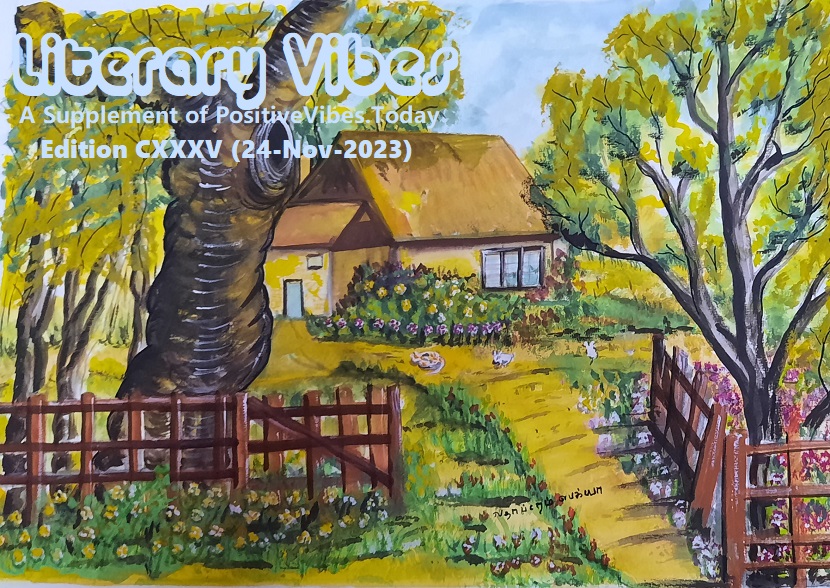
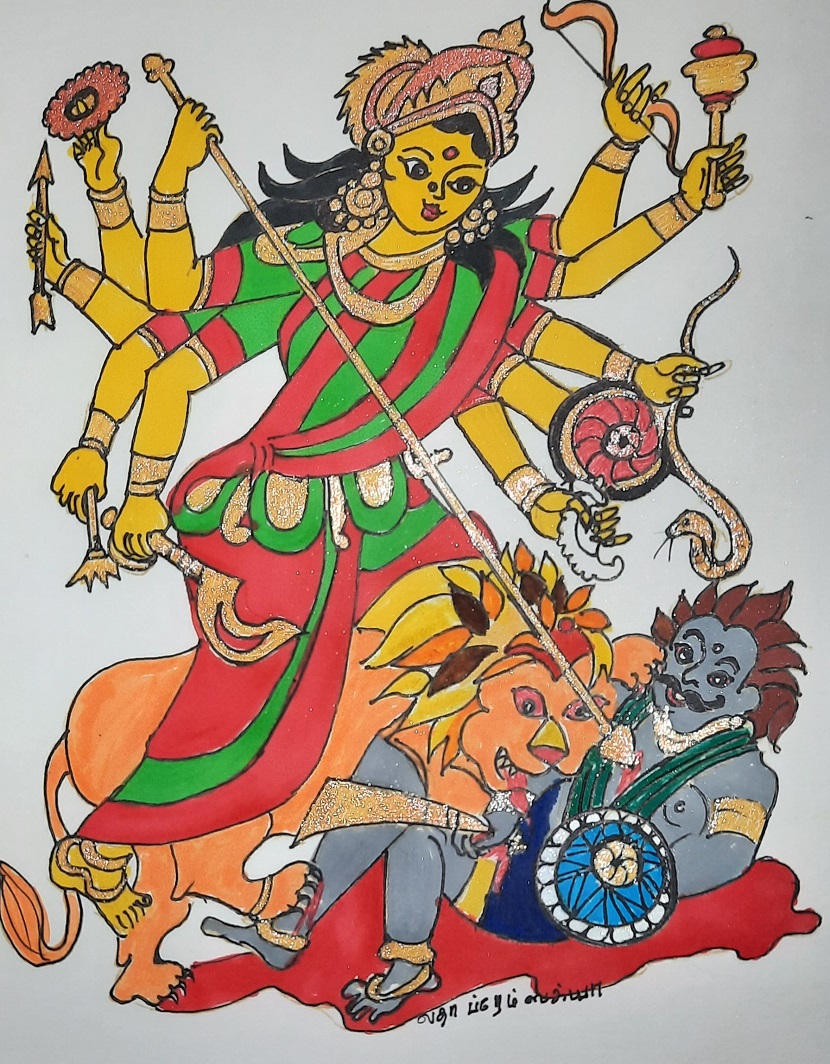
Viewers Comments